#four mothers 1941
Explore tagged Tumblr posts
Text
MIDSUMMER LOVE
Summary: in which George Luz spends no less than five summers swooning over the lovely girl living next door.
Request: Hi rogue!! Idk if you still use the prompts you have listed but if so, may I request prompt 37 (“I’ve actually practiced this.” “Asking me out?” “Yes.”) with Luz? Can it be fluffy too?
Pairing: George Luz x Reader
Genre: Fluff
Tags:
Band Of Brothers: @fernando-jpg @chubbypotatoepie @tvserie-s-world @clumsy-wonderland @lordndsaviorwinters @lanadelray1989 @chanshugsaretherapy @hoddystark @gotxpenny @ecompstolemysoul @torchbearerkyle @easily-obsessed-with-things @fromjupitertocentauri @luvrottt @pansexualwitchwhoneedstherapy
Permanent taglist: @randomparanoid @karlthecat15722 @thebutchersdaughtersblog @amourtentiaa @comfort-reads
Warnings: smoking
A/N: I had to MILDLY edit the prompt for it to fit into the dialogue more naturally but it's still there. God this is such a change from what I've been writing these past months, kind of a breath of fresh air ngl. I wrote this listening to Forever by Noah Kahan, letting y'all know just in case you wanna get in the mood Hope you enjoy it <3
Band of Brothers masterlist
Rogue-durin-16 masterlist

Late June, 1941
The racket going outside wasn't exactly characteristic of a Saturday afternoon. Doors slamming, voices shouting, something heavy thudding against the wooden planks of a porch. I sat up from the couch, craning my neck toward the window just as my mother called out from the kitchen.
"George! Os vizinhos chegaram!" She wiped her hands on her apron, walking out the kitchen and into the living room. "Vai lá fora e pergunta se precisam de ajuda." She commanded, nodding at our front door.
Knowing better than to complain, I dragged myself off the couch and toward the front door. "Sim, mãe." I muttered, poorly slipping into my shoes in order not to step barefoot onto our porch.
I squinted at the house on our right. Their small front yard was cluttered with mismatched furniture. A man stood halfway in the back of a Ford truck, tugging at what looked like a lamp and getting nowhere with it. A woman—maybe his wife—was pointing toward the porch, yelling something I couldn't make out.
I looked back into our house, only to be met by my mother's quiet gestures for me to go over. "Jesus Christ." I cleared my throat, and walked over to lean on the fence separating our properties. "Hey! You folks need any he—"
I didn't finish the sentence.
The most beautiful girl I'd ever seen stepped out of the house, wearing a sundress that fluttered around her knees and a bandana holding her locks out of her face. She moved across the porch with a kind of rhythm that made everything else slow down. A box balanced on her hip, a notebook tucked under one arm.
Her landed on me, bright and curious, and I just gaped like an idiot. For the first time in my life, I had no idea what the hell to say.
So I laughed—awkward and breathy—and gave a small wave. Hopefully, that would be enough to salvage whatever dignity I wished to have. She squinted at me for half a second, then smiled.
God help me.
She walked down her porch steps and stopped at the fence, right across from where I stood. The box was carefully dropped by her side with a strained sigh before she spoke.
"Hey."
"Hey," I managed. Barely. She blinked at me, half expectant, half amused. "Morning,"
"You mean afternoon."
"What?"
"You said morning," she repeated, letting out a soft chuckle. "It's..." she checked her wristwatch and snorted. "nearly four in the afternoon."
Jesus, was she laughing at me? Did I care?
"Shit, right. Welcome—" My voice cracked. I coughed and cleared my throat. "—welcome to the neighborhood."
"Thanks." Her smile tilted further into amusement. "You always stare at people like that?"
"Only when they drop outta the sky."
She laughed, loud and honest, and it felt like sunlight cracked through my ribs. "I'm Y/n. Y/l/n." She held out her hand over the fence.
I stared at it for half a second too long before I wiped my palm on my shorts and took it. How much of a fool could I make of myself in a couple of minutes? "George Luz," I said, my voice a bit steadier this time. "I live next door." I added, pointing behind me with my left hand.
"No shit." She commented with a tinge of harmless sarcasm. Her grip was firm and confident. Not the dainty kind of handshake my ma always said was proper. "Well, Luz-next-door, nice to meet you."
"Likewise," I gave her a wide grin. "You need help with anything?"
She tilted her head, musing the offer. "Think you can help me carry in a record player that weighs as much as a small car?"
"I've lifted worse," I half lied, already walking around the fence to enter her yard. "But only 'cause Ma makes me take out the trash every Thursday."
She let out another of those easy laughs. "You're funny. I like that."
And just like that, I knew I was screwed.
Mid July, 1942
I kicked the gravel off my boots as I came up the walk, shirt sticking to my back and fingers sore from hauling boxes at the pier. The sun was still high enough to worsen the sweat clinging to my temples on the way home, but the breeze smelled like midsummer and cut grass, and I figured I could live with that.
I had a foot on the porch's steps when I spotted Y/n, laid out on a blanket thrown over their patch of grass, book splayed open across her stomach, the shade of the tree dancing across her face. She looked like something out of a Sunday picture show—if picture shows had chipped nail polish and unruly hair tied up in a red scarf.
As if feeling my stare, one of her eyes cracked open at me, a barely contained smile twisting the corner of her lips. She marked her page with a lazy finger and sat up, brushing grass off her skirt.
"Hey, working man." she called with a grin, rising to her feet in order to wander to the fence, the book held with both hands behind her back.
"Don't tell me you've been out here reading all day while the rest of us slave away." I tossed back, tucking my hands into my pockets.
She squinted at me through the sun, both arms slung over the wood between us. "Someone's gotta preserve the nation's intellect while you lift boxes."
I puffed out a chuckle and walked over until I stood on my side of the fence, a couple feet from where she leaned. "And here I thought you were just too lazy to get a real job."
"I have a real job." she replied, faking offense, swinging idly the book to hit my arm with it. "I babysit the Terrell twins twice a week. That's worth a war medal, minimum."
I was about to quip back when I remembered what had been the hot topic at the pier. My smile fell and the quiet between us stretched for a beat. She didn't fill it with a joke—just tilted her head, waiting.
“I think I'm gonna enlist." I announced, voice a little rougher than intended.
Her brows pulled together, fingers tightening on the wood. She kept her heavy gaze on me, chin resting on her forearm like she knew the rhythm of the conversation before it even started.
"It's getting ugly," I went on, squinting at a point just past her shoulder. Maybe if I didn't look directly at her, voicing my thoughts would be easier. "And I don't wanna wait around just to get drafted."
She gave me a slow nod, like she understood everything I wasn't saying and chose not to press.
"I heard about this Airborne thing. Mendonça—he's got a cousin—says it's an elite division or something." I wiped the sweat off my forehead with the back of my forearm. Anything to keep me from staying still. "They pay fifty dollars a month more."
"Gonna aim for that one?" she finally asked, voice quiet but steady.
I scratched the back of my ear, then dug a cigarette out of my pocket and lit it with a flick of my lighter. The smoke gave me something to focus on for a second.
"If I gotta fight," I started, exhaling, "better fight with the best, right?"
She hummed softly, eyes tracing the line of smoke curling into the sky. Her face remained the same, feigning boredom perfectly—except for the slightest glimpse of worry, delicate and tight, settling behind her eyes.
Neither of us said much after that. Just stood there in the yellow haze of summer, pretending nothing had changed when we both knew it had.
Late August, 1943
The battered porch creaked under my shoes as I leaned against the railing, half a cigarette hanging from my lips, another two snug in my pocket as backup. Inside the house, it sounded like a damn circus. Ma had made a whole spread like I was home for good, and not just on borrowed time.
Pa's booming shouts in Portuguese at the poor soul who tried to sneak another slice of roast snuck out the window and into the starlit night. I smiled around the cigarette, exhaling slow, the smoke curling into the muggy summer air.
A pair of heels clicking on the sidewalk attracted my attention like a moth to a flame. Sure enough, there she went, walking down, arms folded loosely in front of her, the hem of her dress swaying just enough to make my heart lurch a little. The streetlight caught in her hair—it seemed longer than I remembered—, and made it gleam just a little. She might as well have been an angel pulled straight from a dream.
I cupped my hand around my mouth and called, "Where's a dame like you coming from at these hours?!"
She stopped dead in her tracks, turned toward my voice. It took her a second to find me under the shadows of the roof, with only the amber tip of the cigarette as beacon.
And then she smiled.
"You're back!" she said, with enough excitement to make my stomach flip.
"Sure am." I tapped the ash off the end of the smoke. "Ma put up enough food to feed a platoon."
"And I was not invited?" she took a hand to her chest with a gasp.
"I went knocking on your door. Your folks said you were away."
"Benny from down the street took me to the movies." she informed me, tucking an unruly strand of hair behind her ear.
I squinted. "And Benny from down the street didn't walk you home?"
"Nope."
I clicked my tongue and took a drag. "Does he not know how to treat a lady?"
"He's a bore." Y/n stated, waving a dismissive hand at me. "I walked him home." She strolled into the yard and stopped just in front of the porch. "Didn't want the boy thinking he was getting a kiss at the doorway." She tilted her chin up to meet my eyes, fixed on her from above. I leaned in, resting my upper body on the railing to be closer to her.
"Poor Benny," I mockingly pouted. "Didn't even know he'd been demoted mid-date from neighbor to bore."
She breathed out a laugh and reached to hold onto the railing, her pinky finger nearly brushing my thumb.
"You look good, Luz." she whispered, soft and genuine.
I pulled the cigarette from my lips and dropped it into the dirt below. "Don't I always?"
She rolled her eyes, but her smile widened. "When'd you get back?"
"This morning. Dropped right into chaos." I gestured over my shoulder with my thumb. "You know 'em. Dot refusing to let go of my arm, Ma crying into the roast beef, Pa fussing over the uniform."
Y/n's pinky tapped my thumb. "They're shipping you out, then?"
"Yeah, in a few days." I swung my foot between the posts distractedly. "Gonna miss my mom's cooking."
Her gaze flicked up to mine, tentative. Maybe shy. "Gonna miss other things?"
I shrugged, a little slower this time. "Maybe."
We stood in the lull—cicadas buzzing, the muffled laughter from inside, and that quiet we never dared to break.
"You gonna write to me?" I asked, unsure about wanting to know the answer.
She looked away for a second. Then back up at me. "Dunno. Are you gonna come back?"
Just a joke. Just a joke, right?
"I'll try." I promised.
"Then maybe I'll try too."
I looked at her a long moment, trying to memorize her face, the exact way her lips twitched when she tried not to smile, the way her dress clung to the soft summer breeze.
"Take care of yourself out there, George."
I gave her a half-smile. "Yes, ma'am."
Her hand left the railing to cling to my shirt, tugging me further down. My heart skipped a beat when she stood on her tiptoes, her lips pressing a kiss right by the corner of my mouth.
She didn't say anything else—didn't even look at me—, just backed away with flushed cheeks in her house's direction.
Early September, 1944
I was mid joke when the mail came. a cigarette hanging from my lips, another one tucked behind my ear as I tried to lift up the company's spirits in yet another gray English morning. Those damn powdered eggs and the smell in the barn turned mess hall weren't doing us any favors, but maybe the jokes would. The letters from home helped, too.
Yeah, the envelope dropped by my tray with my name written in Y/n's handwriting definitely helped.
The familiar perfume clung to the piece of paper made me stall a beat too long after opening it. Long enough for Skip to snatch it off my hands.
"What's this?"
"Give it back."
"Luz has a girl writing him love letters?" he said, leaning away from me with a wicked grin. "What's the world coming to?"
"Jesus Christ, Skip—"
“Let's see—'Dear George'—" he started in a mocking voice.
I grabbed it out of his hands so fast his coffee sloshed. "Mind your business for a minute." I made sure to smack the back of his neck as I swung my leg across the wood bench. "Running your mouth like you don't got Faye's letters under your pillow." I tsked my tongue at him before walking out of the mess hall with the letter in one hand an the envelope in the other.
«Dear George,
Don't faint—I finally found time to write back.
It’s been hot as hell here. I hope the weather is better in Europe. I've been helping your Ma, so there's always something that—she claims—needs doing. I think if I mop that kitchen one more time I might go mad.
Your sister Victoria's got herself a fella now. From Providence. Drives a truck and wears too much cologne. Your Ma says he's "inoffensive", which is the Luz family seal of approval, I guess.
I read about Normandy in the papers. Bobby—Nadia's brother—he died in the landings. Nadia said they told her he didn't make it past the beach. Nearly half the boys from the neighborhood are gone. No one wants to talk about it.
I check the papers for your name all the time. Pa thinks I'm in love or something. I told him I'm just nosey. I didn't tell him I miss you more than I thought I would.
Please come back, preferably in one piece.
Yours, Y/n»
Yours. God, I wish.
I carefully folded the letter and put it back in the envelope to tuck it into my breast pocket. Tapped it twice.
I tossed the burnt cigarette to the gravel, let a new one and went back to the boys trying to ignore the way my heartbeat thrummed in my chest.
Late September, 1945
READER'S P. O. V.
The hem of my skirt was clinging to my calves with the late summer heat, and the iron in my hand let out an impatient hiss every time I paused to yank at the wrinkled sheet beneath it. I could hear my ma somewhere over the living room, probably trying to keep herself busy.
Then, a knock came. It wasn't rushed. Just firm. One—two—pause. Three.
"Ma!" I called out, trying not to burn my fingers. "Can you get that?"
No reply.
The knock at the door came again, quicker this time.
"Ma!"
Nothing.
I rolled my eyes, set the iron aside, and wiped my palms on the front of my skirt. The bandana keeping my hair out of my face had slipped a little with the humidity, and I pushed it back up without much thought as I made my way through the front room.
"I swear," I muttered, swinging the door open with half a huff, "if this is about selling me more—"
I stopped breathing, because George Luz stood on my front porch in full dress uniform, the same roguish slant to his grin—maybe a little duller now, a little unsure. His hair was shorter than I remembered, but his eyes hadn't changed one bit.
"Jesus—"
He gave me a mock salute, a bit too proud of himself for it to be genuine. "I came back. In one piece."
My hand trembled against the edge of the doorframe. I gripped it to keep it from showing.
He was real. He was standing right there. He was okay. I stared at him for so long he shifted on his feet, clearing his throat "You're supposed to say 'good timing, soldier'," he mocked a Hollywood-like voice. "or, y'know, fall into my arms or something."
I should've laughed. Should've followed the joke, but after going two years without seeing him—without knowing if he was alive—, the only thing I saw myself capable of doing was step forward and throw my arms around him tighter than I meant to. His cap tumbled off the back of his head and landed somewhere behind him, but he didn't seem to care. He pulled me in just as tight, chin tucked over my shoulder like he'd been carrying this hug since the day he left.
Half a minute passed, or half an hour. I wasn't counting anymore. I only let go when I felt his hands twitch at my waist. When I pulled back, my eyes burned. If George caught on it, he didn't say a word.
I reached up to adjust the bandana that had slipped again during the hug, but George beat me to it. He fixed it gently, helping me tuck in the stray strands, his hands bumping my own with our actions.
"So," he said, crouching with a complaining groan to grab the cap, "This was supposed to go differently. I had a whole line."
"A line?" I blinked at him, not quite following yet.
"Yeah. I've actually practiced it. In front of a mirror. Twice." He winced. "Felt real stupid, but y'know, sometimes a man's gotta do what he's gotta do."
I tilted my head, trying to read him. "A line for what?"
"For asking you out." He scratched at the back of his neck. "It was a real good line too. Something about the war being awful and the food being worse, and missing the summers here and hearing your voice through the fence." He nodded at the barrier between our yards. "Kind of fucked it up."
"You practiced asking me out?" I questioned, half amused, half disbelieving.
"Yes! Have you gone mad?" He snorted like I was being stupid, but I didn't miss the way the tips of his ears turned pink. "You thought I'd show up here improvising?"
"You're good at improvising."
"I wanted to be better."
I exhaled, almost a laugh, but it caught at the end and turned into something softer. "Wanna go back and practice it once more? Three time's the charm."
An almost offended laugh escaped George, his shoe pivoting to do a half turn. "Screw you."
"That's no way to talk to a lady." I joked, catching his hand with mine, still shaking slightly, when he pretended to step away. "I'm joking." George returned to me without much complaining. "Just ask, you know what the answer's gonna be."
"Do I?"
"George—"
"Go out with me." The jokester attitude fell for half a second; long enough for me to realize he was wearing his heart on his sleeve. "Please?"
"Hmm... Dunno,"
"Y/n, c'mon—"
"Yes." His warm eyes lit up, and so did my cheeks when his fingers intertwined with mine. "Let me change first."
"Wait, now?" He frowned, the open-mouthed smile not once leaving his face.
"I waited five years for you to ask me out." I tossed my bandana at his frozen form, still standing at the doorway. "I'm not waiting around."
Whatever mockery was leaving his loud mouth didn't reach the upper flight of stairs when I rushed up to my room. He'd have time to make fun of my eagerness later, and I doubted I would care. He came back to me, that's all that mattered.
#george luz x reader#george luz imagine#george luz fanfiction#george luz#george luz x you#george luz fluff#george luz angst#george luz fanfic#george luz fic#band of brothers hbo#band of brothers fic#band of brothers#band of brothers fanfiction#band of brothers fluff#band of brothers x reader#hbo war fic#hbowar#hbo war#hbo miniseries#rpf#band of brothers fanfic#bob request
91 notes
·
View notes
Text
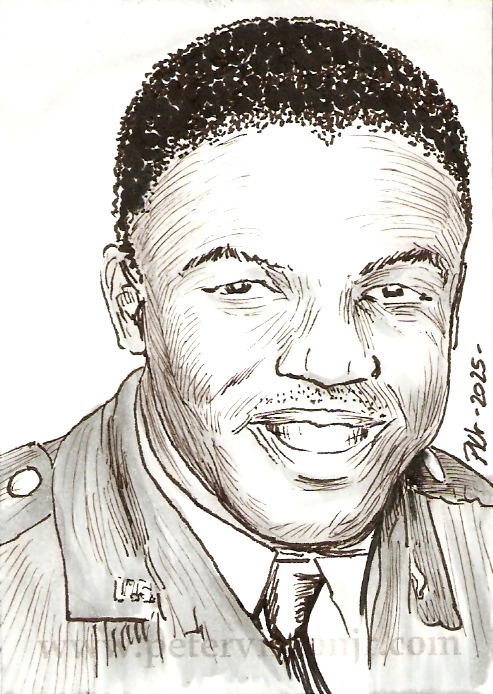
"My lawyer summed up the case beautifully by telling the board that this was not a case involving any violation of the Articles of War, or even of military tradition, but simply a situation in which a few individuals sought to vent their bigotry on a Negro they considered 'uppity' because he had the audacity to exercise rights that belonged to him as an American and a soldier."
While his legendary contribution to baseball is of course widely known and (rightly) celebrated, the military service of Jackie Robinson is perhaps less familiar. The future barrier-breaking athlete was born in 1919 in Cairo, Georgia, but his father left the family when Jackie was still a baby --his mother moved the family to Pasadena, California in search of better prospects but the family was never able to truly rise up out of poverty. Robinson's early athletic abilities earned him varsity letters in no less than four sports (football, basketball, track, and baseball). In 1939 Robinson graduated from Pasadena Junior College and was accepted at UCLA, where he again lettered in the same four sports. His athletic path ostensibly fixed in the heavens, his life nevertheless took something of a detour in 1942, and he found himself drafted into a segregated all-Black U.S. Army unit based out of Fort Riley, Kansas.
Robinson earned his commission as a second lieutenant a year later (making him one of a very small minority of Black officers at the time, as Black soldiers were generally not accepted at Officers' Candidate School), and was assigned to Fort Hood, Texas as part of the 761st Black Panthers tank battalion. Significantly during Robinson's time in the service, he was part of the "Double V" (double victory) movement, an assertion that Black soldiers use their wartime service to not only fight rising fascism abroad, but also institutionalized racism at home. This campaign was borne out of an editorial in The Pittsburgh Courier that (not-so-rhetorically) asked, "Would it be demanding too much to demand full citizenship rights in exchange for the sacrificing of my life?" The hypocrisy that the article called out, was then further amplified in a speech by no less than W.E.B. Du Bois (see Lesson #1 in this series). Robinson, mindful of his public status (he was already something of an athletic role model, at this point), stuck to his convictions and wore the "double V" button.
On the pivotal date of July 6, 1944, Robinson happened to be aboard a civilian bus bound for Fort Hood, but when additional white passengers boarded, he refused the driver's order to move to the back. Despite Executive Order 8802 having been in effect since June 1941 (a directive that banned discriminatory practices throughout all Federal agencies including the War Department), MPs and Fort Riley's provost marshal were nevertheless called and Robison was arrested and court-martialed. Six charges initially arose from his seat refusal: disturbing the peace, drunkenness, conduct unbecoming an officer, insulting a civilian woman, insubordination, and refusing to obey the lawful orders of a superior officer. These obviously-inflated extra charges were eventually dismissed but that was very much not the norm for Black officers serving at that time, and the court-martial became not so much a question of internal discipline, but of unwillingness to bend to bigoted Southern customs and traditions. A court of nine combat officers ultimately acquitted Robinson and his Army career could continue, despite a deeply contentious process that could very easily have gone the other way.
He was then transferred to Camp Breckenridge (Kentucky), and served as a coach for the Army athletics until his honorable discharge in 1944. His army career thus over, Robinson would return to athletics and play for various Negro League teams, the first steps along the path that would eventually bring him to his history-making 1947 signing with the Brooklyn Dodgers.
(And... I guess this means I have again --technically-- drawn another baseball card for this series.)
#black lives matter#black history#major league baseball#jackie robinson#number 42#department of defense#smithsonian#double v#wwii#segregation#censorship#do not comply in advance#teachtruth#dothework#showup
86 notes
·
View notes
Text
Who is This?: Chapter 2
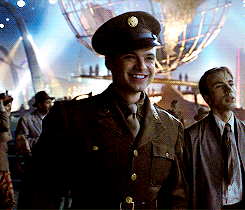
Pairings: Bucky Barnes x reader
Summary: Y/N talks about how she met James Barnes and how she found herself in the modern world. Follow on from this fic.

"What the hell is going on?" Bucky nearly demanded, keeping his arms wrapped around his companion.
Sam raised his eyebrow. "I could ask you the same question, Barnes?" Sam looked at the young woman in Bucky's arms. "Who is this?"
Bucky looked down at her, Sam watched as a smile grew on his face. "This is Y/N. Y/N Barnes. My wife."
"I'm sorry, what was that? Wife? You two are married?" Sam asked, looking between Bucky and Y/N.
"Indeed we are, aren't we darling?"
Y/N looked at Bucky first with a smile then with dead eyes. "I'm still pissed with you," Sam couldn't place her accent. It was a strange combination of Brooklyn, southern and English.
"Babydoll," Bucky sighed, as his wife got up from the couch and walked to the kitchenette.
"No. Don't you babydoll, me. I had two officers with a telegram in their hand as they flat out told me you had fallen off a train in the Alps of all places, whilst you were on some stupid mission with Steve, they never went looking for you, they simply declared you were missing and you were most likely dead."
Bucky's face falls, realising how much she had missed him after he fell off the train. After he had escaped to Bucharest, his memories came back in flashes - her face had always been there front and centre. He never had the time to sit Steve down and ask him about the gorgeous girl in his memories. It had taken another trip to the Smithsonian Institution - and that's when he saw her further into the exhibition, her arms in both Bucky and Steve's as she looked up at him in awe. Bucky and Y/N were married on January 15, 1941 - four weeks after Bucky signed up.
He gets up also, leaving the blanket which once covered them in a ball on the couch. "Sweetheart," he said softly.
"They told me on our fucking anniversary as well!" The tears couldn't be held back as they started rolling down her cheeks.
"It may be late, but happy anniversary," Bucky says, which gets a watery sob out of Y/N - who returns the sentiment.
Sam walks around the couple and into the kitchenette. "How long have you two now been married then?"
They looked at each other. "If you don't count the time we were separated, three years."
"And if you do?" Sharon asks.
"Eighty-three."
"Seems like I owe you a lot of anniversary presents. And birthdays, and Christmas..." Bucky trails off. "Seeming like I'll always be in debt to you, doll."
She shakes her head, "I have you here now. That's the only present I need."
"So how did you two meet?" Sam asks.

August 3rd, 1922
It was the first day at Brooklyn Heights Elementary School. Winnifred Barnes held her eldest son's hand as she took him to school.
Little James Barnes was terrified, it would be his first full day away from his ma, he didn't know anyone and he had a strong feeling like he wanted to cry (his father George had firmly told him men don't cry).
The mother and son duo were stood in front of a little peg, which had his name stuck to it, he was in between someone called Steve and someone called Y/N (the little girl had already taken her coat off - which her mother was hanging up for her, as she dug through her backpack on the floor).
"Y/N what have I told you about sitting on the floor like that?" Y/N's mother said, cupping her hands underneath her armpits and sat her on her knees.
"I can't find my crayons, mama!" Y/N exclaimed, looking up at her mama.
James looked down into his backpack and saw the small pack of crayons his father had brought back home one night. "We can share mine," he tells the little girl on the floor, sitting down next to her.
She looked at him with a big smile. Even at four years old, he couldn't help but think she was the prettiest girl in the world.

"That's how you got your girl? Crayons when you were four?" Sam asks.
"No, I had always known she was beautiful, but it took me a long time to persuade her for a date."
Y/N looked at her husband with a singular raised eyebrow. "You went from girl to girl with no consideration of their feelings. I didn't want to be put on the same list."
"Not a chance, since we locked eyes on that cold floor in elementary school, I have always been yours."

January 15, 1940
"Please, doll," Bucky nearly begged, as Y/N made her way around the counter at the local diner where she currently works. "Just one date."
"No, James, you can't ask me just because you don't have a date for the night."
Bucky sighed, he loved how she was the only one (apart from his ma when he annoyed her) who still called him James. "But, doll."
"And what have I told you about calling me doll?"
"I could take you to Coney Island," which was shut down saying that was his and Steve's 'place to hang out without her'. Bucky denied it, saying that it wasn't right that he and Steve spent time together without her. "What about the movies?"
"The three of us have already seen everything at the movies right now."
Bucky looked at the ceiling, as he fiddled with his ice cream float. "You don't want to go to Coney Island, we've seen everything at the movies and you don't want to go to a diner..."
He heard someone make a passing comment that the river in that park upstate had frozen over and was perfect for. "Ice skating! That's it, I'll take you ice skating!"
Y/N looked over at him, "Will it shut you up?" He nodded. "Fine, you can take me ice skating."
Bucky let out a loud cheer. "I promise you, you won't regret it, babydoll."
Bucky leaned over pressed a kiss to her cheek and ran out of the diner - he missed Y/N rubbing her cheek with a growing smile on her face.

"You were smitten with me?"
"Since day one, babydoll."
They shared a kiss when the door was pushed open by someone who looked like he had a homemade costume Steve used to wear. "What the hell?"
"Alright, that's it. Your time is up. Tell me where Zemo is," someone came storming in, dressed like Steve, shield in one hand as he pointed at the other people in the room. Y/N looked from Bucky to Sam to Sharon and then back to Bucky.
"We know you're hiding him," his sidekick added, crossing his arms.
The Captain America wannabe ordered them to turn over Zemo, which Y/N countered with a comment about the Captain America wannabe running his mouth.
"How did I miss you?" He flirts.
Y/N raised her eyebrow at him, then looked up at Bucky (who whispered into her ear that they were trying to get the shield back). "Give me a second," She puts on a look on her face and makes her way over to the Captain America wannabe. "Oh my God, is that the shield?" She could see him preen at her words. "Can I have a look at it?"
Stupidly, he hands her the shield, Y/N looks it over, and then up at him. "Thanks," and makes her way back to Bucky.
"What are you doing with my shield?"
"I think you mean, my shield. Considering that it technically belongs to me."
Captain America wannabe looked at her confused, what the hell was she talking about? "Who even are you?"
"Who am I? He doesn't know, James!" Y/N looked up at Bucky. "He doesn't know!" The couple laughed. "I'm Y/N, Steve's half-sister, and this muppet's wife."

"Wait, so how did you end up 80 years in the future?" Sam asks as the trio settles in for the night.
"Howard wanted to make another Super Soldier after the war after Steve had 'died'," she puts quotes around died, then turns her head to look at Bucky. "Yes, I know what happened to Howard and Maria," Bucky's face fell - she knew what he had done as the Winter Soldier(the war crimes he had committed had been plastered all over the news during his trial).
Sam looked between Bucky and Y/N as he asked. "What happened? I presume you volunteered."
She nods her head. "I did. But, something went wrong. They gave me the serum, and I remember collapsing to the floor and the next thing I knew I was waking up in the year 2019, Steve's face over the top of mine, tears in his eyes, saying he was so happy to see me."
"Steve knew you were alive?" Bucky asked, looking at his wife in surprise. There were about two weeks between the Battle of Earth and Steve went back to the past.
"I don't remember much from when I woke up, because I was falling in and out of sleep, for a long time." She says, looking up at the ceiling.
#bucky barnes x reader#bucky x reader#james buchanan barnes#reader#bucky fic#bucky x female reader#follow up to previous bucky fic#People were asking for it#So ta da!
591 notes
·
View notes
Text
THURSDAY HERO: Franciszka Halamajowa

Chana and Moshe Malc were traditional Jews living in Sokal, Poland (modern-day Ukraine) with their two young children when the Nazis occupied their town in 1941. Immediately, local residents were emboldened to persecute their Jewish neighbors and violent attacks became common. A squalid, overcrowded Jewish ghetto was established in 1942 and the Malcs were taken from their home and forced to live there.
The Germans began rounding people up, a thousand at a time, and sending them from the ghetto to death camps. Frantically, the Malcs found an attic where six-year-old Chaim Malc could hide, and then Chana, Moshe and their toddler Lifsha, growing desperate, took refuge in a dank cellar with 30 other Jews. They were able to rescue Chaim from his solitary hiding place and bring him to the cellar, but unfortunately Lifsha wouldn’t stop crying. Tragically, a Jew who was forced by the Nazis to search for hidden Jews heard Lifsha’s wails and took her from her family and handed her over to a German soldier, making sure that the other Jews in the cellar wouldn’t be discovered.
Devastated by the loss of their precious daughter and aware that their own days in the ghetto were numbered, the Malcs knew their best chance of survival was to find a place to hide outside the ghetto. They managed to sneak out, but where could they go? They knew one Polish woman, Franciszka Halamajowa, and with nowhere else to turn, they went to her home and pleaded for help. Chaim Malc later explained how the family knew Franciszka. “You never know when you do a favor for someone what it will bring eventually. In 1936, my father and grandfather were traveling with a horse and wagon and they stopped for a woman who was waiting at the side of the road with a lot of parcels – this was how they met Franciszka.”
A kind-hearted woman who was grateful for the Malcs’ help several years before, Franciszka and her young adult daughter Helena warmly welcomed the Jewish family into their humble home. They furnished a small attic room above the pigsty for the Malcs and provided for all their needs. Franciszka’s son Wilmus helped them procure extra food and supplies for the hidden Jews. Franciszka and her family were fully aware of the risks they incurred by secretly sheltering the Malc family; the penalty for hiding Jews was execution on the spot. Franciszka was a devout Catholic who believed that God put the Malcs in her life so that she could help them.
Soon, members of the extended Malc family also moved into Franciszka’s cramped attic, including Moshe’s mother, sisters and niece. A few months after that, Moshe’s brother Shmelke joined them, along with the four-person Kindler family, bringing the total of attic dwellers to thirteen. They had to keep quiet, and spent the long days praying, writing, and playing chess. Moshe Malc kept a diary in Yiddish, his native tongue. Amazingly, young Chaim later said, “There were high spirits in the hideout in the attic.”
Dr. Kindler was an experienced local physician who provided medical care when needed to the thirteen people in the tiny attic. Sadly, Chaya-Dvora Malc, Moshe’s sister, died of typhus and was buried under the apple tree in Franciszka’s yard. Dr. Kindler’s medical acumen prevented anybody else from getting sick, and in fact saved their lives in another way. Franciszka’s neighbors found out about the hidden Jews and threatened to report them to the Gestapo. In exchange for free medical care from Dr. Kindler, the neighbors kept their mouths shut. Meanwhile, the Polish residents of Sokal were abandoning the city because of the fear of enemy attacks.
After the Jews had been safely hidden for twenty months, Franciszka was devastated when Nazis suddenly turned up at her front door. They didn’t know about the hidden Jews; they were there to build radar equipment on the roof of Franciszka’s home. Certain that the end was near, the Jews actually contemplated committing mass suicide rather than be sent to a Nazi death camp. Miraculously, the Germans suddenly abandoned the project – perhaps because the Russian army was closing in on Sokal.
One month later, the city was liberated and for the first time in almost two years, the Malcs and Kindlers went outside. They were surprised to learn that Franciszka had actually hidden three more Jews inside her home, and they helped her cook meals and do laundry for the Malcs and Kindlers. Chaim later remembered the monumental day of liberation. “We emerged on a sunny day in July. We could hardly talk or walk. I was eight years old.” The thirteen Jews hidden by Franciszka were among only 30 of Sokal’s 6000 Jews to survive the war.
The Malcs went from Sokal to a Displaced Persons camp in Germany, where they had another son, Nathan, and then they immigrated to the United States. Franciszka never told anybody about her brave actions during the war, and went to her grave as an unknown hero. In 1984, Franciszka (posthumously) and Helena were honored as Righteous Among the Nations by Israeli Holocaust Memorial Yad Vashem.
Moshe Malc’s diary survived the war to become a family treasure. Sixty-four years after they were liberated, Moshe’s granddaughter Judy Maltz made a feature-length documentary about Franciszka Halamajowa, the brave and pious Polish woman who saved three Jewish families. The movie is called “No 4 Street of Our Lady” – Franciszka’s address. It wasn’t until after the movie came out that Franciszka’s own grandchildren learned the extent of what she did.
For saving 16 Jews from the Nazis, we honor Franciszka Halamajowa as this week’s Thursday Hero.
67 notes
·
View notes
Text
Names in Severance
Studies show that first names tend to be particular to individuals, whereas surnames are tied to the family.
- The You You Are, Dr. Ricken Lazlo Hale, PhD
I went on a deep dive on researching name meanings on Severance, as I'm sure many others have. For those of you not insane enough to do this, my findings are below the cut.
Spoilers up to and including episode four of season two.
Why am I doing this? Well, names play a massive role in this show.
Gabby chooses the name William for her baby but Gabrielle names him Declan, which clues Devon in to something being up with her. The first chapter of The You You Are is about names, and after Ricken's reading Rebeck says she'll have to change her name again.
But most notably: the innies have no last names of their own and don't know the first names of their superiors. This divide is a huge aspect of the power dynamics of the severed floor and seemingly the rest of Lumon, as Cobel is referred to casually as Harmony by Natalie and other superiors but only ever as Ms. Cobel by the MDR department. Helena knowing Milchick's first name and casually calling him by it is what finally confirms Irving's suspicions, and he immediately weaponizes it against him. "Yes, do it, SETH."
I'm listing the full known name at the top (except for repeats like last names being the same) and then the meaning of each name in a subsequent line. So for example "Ricken Lazlo Hale" gets three lines: the first one for Ricken, then Lazlo, then Hale. If it's in the same line it's a different possible meaning for the same name. My own notes are in brackets.
MDR
Mark Scout of Mars (the god) - warlike, indicator, sign someone who goes ahead to gather information about enemies
Peter Kilmer stone kiln worker, famous sacrifice
Helly R. / Helena Eagan torch (Helen of Troy's kidnapping started the Trojan War) little fire
Irving Bailiff green water, river Irvine law enforcement officer
Dylan George toward the tide (going with the flow?) farmer, earthworker
ADMIN
Judd a river, descending, flowing down (the river where Jesus was baptized by John)
Harmony Cobel / Selvig agreement, calm, music (harmonizing two different tones) fishing boat bay of seals (nordic place name, I thought this was meaningless until episode four and now I'm like ???)
Seth Milchick appointed, placed (the third son of adam and eve sent to heal the family after cain killed abel) a jewish dietary law forbidding "boiling a (goat) kid in its mother's milk" (this has got to be on purpose, but what does it mean??)
Natalie Kalen christmas day, birth of the lord slender, fair, blessed, pure, keeper of keys
Ms. Casey watchful, vigilant (this one really convinces me some of these names are chosen with great care)
Doug Graner dark river manager, german place name
Ms. Huang phoenix (literally coming back to life in a blaze of fire)
MARK'S LIFE
Gemma gem, precious stone, "a small cellular body or bud that can separate to form a new organism"
Devon cattle, divine, poet
Ricken Lazlo Hale powerful, wealthy ruler healthy
Eleanor shining light
Patton Thune nobleman money
Rebeck Gulk instrument, tie, snare friend/servant (sometimes: of Christ)
Danise devoted to bacchus / dionysus
Alexa defender of man
THE EAGANS
Kier (CEO 1865-1939) a vat where fabrics are boiled/bleached/dyed
Imogene maiden, innocent
Ambrose (CEO 1939-1941) immortal
Myrtle (CEO 1941-1959) evergreen shrub (evergreen = never dies)
Baird (CEO 1959-1976) poet
Gerhardt (CEO 1976-1987) hard spear
Phillip "Pip" (CEO 1987-1999) friend of horses seed, excellent
Leonora (CEO 1999-2003) light
Jame (CEO 2003-) follower, supplanter, protector
Helena torch
OTHERS
O&D
Burt Goodman fortified town good man
Felicia lucky, successful
DYLAN'S FAMILY
Gretchen pearl
Jim protected/protector
Merrick fame, power, ruler of the sea, dark
Ruth friend, pity, compassion
PETEY'S FAMILY
June young
Nina little girl / shortened form of any name ending in -nina
THE ARTETAS
Angelo Arteta angel evergreen oak
Gabrielle / Gabby woman of god / talkative
Bradley (NOT William) broad meadow (NOT will helmet / desire to protect)
Declan good man / man of prayer
Kai keeper of keys, the sea, king
MISC.
Asal Reghabi honey again stupid? (ghabi = stupid)
Cecil Fields (Burt's partner) blind / sixth pasture
Charlotte (Cobel, name on breathing tube) free
—
And what does all this mean? WELL, some themes I'm picking up on are the water, fire and earth, as well as light and living forever. It's of interest to me that both Gemma and Peter refer to a sort of stone, which is a plus for Mark/Petey shippers. There's a lot of water imagery connected with Lumon, but Eagan means fire. Then there's Huang meaning phoenix, which is rebirth through fire. I'm not sure how to take this yet but it's percolating.
The double meaning of Gemma is also really giving some big clone energy, I'm sorry to say. I know the makers of the show have stated that there's not a clone thing going on, but there's something happening here. I hope Ms. Huang isn't her clone, mostly because they're wildly different looking people whose only real commonality is being asian women.
I've also been looking into alchemy and the Philosopher's Stone as it relates to the themes of Severance, and all of this really rhymes with a lot of that. (I might make a seperate post about it tbh.)
Kilmer meaning kiln worker also really fucks with me, what with the water/fire/earth thing. You need water to mold clay, but firing it in a kiln turns it solid. In the Perpetuity Wing Irving tells Helly: "It’s an unnatural state for a person to have no history. History makes us someone. Gives us a context. A shape. But waking up on that table, I was shapeless." And Mark was a professor of history, and Casey made him sculpt his feelings out of clay, and he sculpted the tree that Gemma hit with her car, which neither of them remember... there's something here, I think.
I think Ricken and his friends, especially Patton, are descended from old money and may even be distantly related to the Eagans.
And then there's Reghabi, which doesn't seem to exist as a name/word outside of this show, but "ghabi" literally only returns results about the Urdu word meaning "idiot". I might be way off base but it makes me worried Reghabi isn't trustworthy. It's giving "the surest way to tame a prisoner is to let him believe he's free".
66 notes
·
View notes
Text
And here it is! My personal timeline of the entirety of The Marvin Trilogy. I have more notes in my doc about particulars of Marvin’s life, but you’ll just have to read my fic to learn those… which… I will update soon. I swear. Don’t come at me.
@alebanana we were talking about timelines so I hope you don’t mind me tagging you, I’d love to see your ideas and compare!
If anyone has questions or comments please tell me I need to talk about this with people!!
Timeline below the cut
-June, 1941– Mother and Father graduate high school
-November, 1941– Mother and Father get married
-April, 1942– Father gets drafted and soon after sent away
-February 21st, 1943– Marvin is born
-December 8th, 1943– Trina is born
-July 1944– Father returns
-1945– Mendel is born
-1948– Charlotte is born
-October 27th, 1949– Whizzer is born
-1952– Cordelia is born
-Feburary 21st, 1957– Marvin turns 14 (How Marvin Eats His Breakfast, Marvin’s Giddy Seizures, The Rape of Miss Goldberg)
-November 4th, 1957– Marvin is cast as Columbus (My High School Sweetheart, Set Those Sails)
-March 17th, 1958– Marvin acts in the show (How America Got Its Name)
-May 20th, 1960– Sweetheart wants to have sex with Marvin (I Swear I Won’t Ever Again Pt. 2)
-June 14th, 1961– Marvin graduates high school (High School Ladies at Five O’Clock)
-February 3rd, 1965– Marvin and Trina meet (Love Me For What I Am)
-March 29th, 1965– Marvin and Trina begin to date
-June 14th, 1965– Marvin graduates college with a bachelors in history or some shit
-June 14th, 1966– Trina graduates college with bachelors in teaching
-February 14th, 1968– Jason is conceived (Nausea Before The Game)
-April 25th, 1968– Marvin and Trina learn she’s pregnant and Marvin proposes (My Chance To Survive The Night)
-July 8th, 1968– Marvin and Trina get married (I Am Wearing A Hat, Wedding Song, 3 Seconds, Wedding Song Pt. 2, How The Body Falls Apart)
-October 16th, 1968– Jason is born
-June 24th, 1970– Jason is a fitful sleeper like his father (I Can’t Sleep, Helluva Day)
-December 20th, 1974– Marvin thinks about his family while with Mendel (I Swear Won’t Ever Again Pt. One)
-November 3rd, 1976– Marvin sees Mendel and reveals the truth (I Have A Family)
-November 3rd, 1976– After therapy, Marvin walks in front of a gay bar and debates going inside. Whizzer sees him and brings him home (Marvin’s Giddy Seizure Pt. Two, I Swear I Won’t Ever Again Pt. Three, Marvin Takes A Victory Shower)
-August 7th, 1977– Marvin is off sleeping with some rando (Your Lips and Me)
-November 5th, 1978– Marvin and Whizzer sleep together again after accidentally getting family photos from him (I Feel Him Slipping Away)
-December 8th, 1978– Marvin and Whizzer ‘get together’. Marvin views their relationship from their first encounter, Whizzer from here, creating the nine/ten month thing (Whizzer Going Down, Another Sleepless Night)
-July 6-7th, 1979– Whizzer and Marvin have sex and Trina comes home, Marvin comes up with the excuse of Whizzer staying over for Shabbat. The whole gang goes to shul, then go back home for dinner sans Mendel (Four Jews In A Room Bitching)
-July 7th, 1979– Trina catches Marvin and Whizzer, (Goodnight No Hard Feelings, A Breakfast Over Sugar, Packin’ Up, Been A Helluva Day)
-????????�� In Trousers The Dream
-August 26th, 1979– First dinner together after the separation (A Tight-Knit Family)
-August 31st, 1979– Trina starts seeing Mendel (Love is Blind)
-September 3rd, 1979– Marvin and Whizzer are living together in a new apartment, not the one Marvin stayed with Whizzer in when he first left Trina (Thrill of First Love)
-September 13th- 27th, 1979– Marvin sees Mendel (Marvin At The Psychiatrist)
-October 7th, 1979– Jason being Jason during family dinner, which Whizzer is supposed to be making at the Whizzvin apartment. Trina and Jason go over (Jason brings chess obviously) and Marvin meets them there after work. Whizzer hasn’t made dinner, Trina and Jason go home, Marvin yells at Whizzer for not being home (My Father’s a Homo, Everyone Tells Jason To See A Psychiatrist, This Had Better Come To A Stop)
-October 8th, 1979– Trina and Marvin both go in to Mendel early, Whizzer is in the waiting room (This Had Better Come To A Stop)
-October 9th 1979– Trina cooking dinner for Jason and herself (I’m Breaking Down, Please Come To My House)
-October 15th - November 19th, 1979– Jason’s therapy sessions with Mendel (Jason’s Therapy)
-November 25th, 1979– Mendel has joined family dinners before now, Marvin and Whizzer arrive to eat, they see Mendel propose to Trina (A Marriage Proposal)
-November 25th, 1979– After Mendel leaves that night, Trina ponders a lot on what saying yes would mean (Trina’s Song, March of the Falsettos, Trina’s Song Reprise)
-November 29th, 1979– Marvin goes to Mendel for the final therapy session (A Tight-Knit Family Reprise)
-Buy a dog in here somewhere
-December 14th, 1979– Marvin and Whizzer just had a nice anniversary, then they break up (The Chess Game)
-December 14th, 1979– Whizzer packs up his suitcase and gets a call from Jason– no one has picked him up from school. Whizzer gets him and brings him to Trina and Mendel’s new house which they are currently moving into (Making A Home (first night of Chanukah), The Games I Play)
-December 14th, 1979– Marvin comes home from wherever he went and finds the wedding invitation, he goes to Mendel’s house and blows a fuse (Marvin Hits Trina, I Never Wanted To Love You)
-December 14th, 1979– Father son bonding (Father to Son)
-May 27th (at eight), 1980– Mendel and Trina get married
-March 10th, 1981– Mendel and family yapping because he can (Falsettoland)
-March 19th, 1981– Sunday night, Trina coming to pick Jason up, then everyone starts arguing about the bar mitzvah… as always (Year of the Child)
-April 4th, 1981– Jason’s first baseball game (Miracle of Judaism, The Baseball Game)
-April 14th, 1981– Whole cast doing their things (A Day In Falsettoland)
-April 26th, 1981– Whizzer hasn’t moved in with Marvin yet, but they’re much happier this time around. Of course, everyone is still fighting about the bar mitzvah (Round Tables, Square Tables, Everyone Hates His Parents)
-June 11th, 1981– Whizzer has long since moved in with Marvin, and they are literally sleeping together (What More Can I Say)
-July 5th, 1981– Charlotte reads the CDC and New York Times articles published on July 3rd (Something Bad Is Happening)
-August 24th, 1981– Whizzer and Marvin play racquetball before going to pick up Jason. They never get to Trina’s to pick up Jason (More Racquetball)
-August 24th, 1981– Trina goes to the hospital (Holding To The Ground)
-September 28th, 1981– Everyone comes to visit Whizzer, who is getting worse. They lie to him (Days Like This)
-September 28th, 1981– Jason talks to his mom (Cancelling the Bar Mitzvah)
-September 29th, 1981– In the hospital (Unlikely Lovers)
-October 6th, 1981– In the hospital, Jason is visiting Whizzer while Marvin talks to Charlotte. Neither of them admit they heard the other (Another Miracle of Judaism, Something Bad is Happening Reprise)
-October 16th, 1981– Whizzer knows he can’t keep holding on (You Gotta Die Sometime)
-October 16-17th, 1981– Jason turns 13 and Whizzer dies (Jason’s bar mitzvah, What Would I Do)
-October 18-25th, 1981– Shiva (Falsettoland reprise)
-ALTERNATIVELY October 20th, 1982– Grave unveiling, Marvin is noticeably sicker (Falsettoland reprise)
-December 28th 1983– Marvin dies at 3:09 in the afternoon
#falsettos#march of the falsettos#Falsettoland#Marvin falsettos#whizzer brown#whizzer falsettos#whizzvin#Trina falsettos#trina weisenbachfeld#mendel weisenbachfeld#mendel falsettos#Jason falsettos#Cordelia falsettos#Charlotte falsettos#in trousers
50 notes
·
View notes
Text



Edwin Muir was born in Deerness, Orkney Islands on May 15th 1887.
He was the youngest of six children was initially raised on a farm before his family moved to the island of Wyre and then later the mainland of Orkney. His parents were farmers and when he was fourteen his father lost the family farm. This forced the Muirs to make another move to Glasgow where they hoped to secure their finances.
The move to Glasgow, from agricultural life to an industrial one, was extremely hard on the family. Within a few years, Muir’s father, mother, and two brothers died. These losses, added to the succession of poor jobs made his youth an unhappy one. He spent time working in factories and offices. The work was psychologically destructive to the young man but helped to inform Muir’s later poetic works. It was in 1913 that he began to write poetry, some of which was soon published in New Age. The passion seemed to drain from this pursuit quickly though and he turned to journalism.
A few years later, in 1919, he married Wilhelmina Anderson who was a teacher and linguist. The two moved to London together. Muir would later speak on his marriage as being the most important thing in his life. He and his wife would work together on a number of translations throughout the coming years, including Kafka, (those for which he is best-known). In the early 1920s, the couple lived in a number of different cities throughout Europe. In 1924 they returned to the UK where Muir began seriously publishing.
The translations that Muir and his wife worked on together became their main source of income. This was particularly helpful during the beginning of the second world war. The two worked on translating the works of Gerhart Hauptmann, Heinrich Mann, Hermann Broch, and more. This time period also saw Muir’s reputation as a critic grow. He wrote Latitudes and The Structure of a Novel. In 1927 Muir published his first novel, The Marionette.
The 1930s saw Muir begin a series of projects which included a number of travel and history-related works for Scottish Journey, a biography, and two autobiographical novels. In 1941 he accepted a position with the British Council and moved to Prague and Rome. The following years were highly productive and included his eventual naming as the warden of Newbattle Abbey College. His final collection was published in 1956 and he died in Cambridge in 1959.
Robert the Bruce (To Douglas in Dying)
'MY life is done, yet all remains,
The breath has gone, the image not,
The furious shapes once forged in heat
Live on though now no longer hot.
'Steadily the shining swords
In order rise, in order fall,
In order on the beaten field
The faithful trumpets call.
'The women weeping for the dead
Are not sad now but dutiful,
The dead men stiffening in their place
Proclaim the ancient rule.
'Great Wallace's body hewn in four,
So altered, stays as it must be.
0 Douglas do not leave me now,
For past your head I see
'My dagger sheathed in Comyn's heart
And nothing there to praise or blame,
Nothing but order which must be
Itself and still the same.
'But that Christ hung upon the Cross,
Comyn would rot until time's end
And bury my sin in boundless dust,
For there is no amend.
'In order; yet in order run
All things by unreturning ways,
If Christ live not, nothing is there
For sorrow or for praise.'
So the king spoke to Douglas once
A little while before his death,
Having outfaced three English kings
And kept a people's faith.
13 notes
·
View notes
Text
I decided it’s time for an updated version of my original Tom Riddle and WWII post which you can find here. It detailed how I thought his summers might have been like, but it was misinformed slightly.
Canonically Tom was 12 when WWII started on September 1st, 1939. However, he was not at the orphanage at this point and wasn’t in London during Operation Pied Piper which was a mass evacuation. This was a government funded evacuation, was optional and was open to minors, the disabled and mothers with children under the age of four.
I mention this because this directly impacts Wool’s, the orphanage Tom lives in during the summers. Orphanages were extremely important during WWII so I do not believe they would relocate, but they likely sent many of their younger charges and maybe even their older to the country and maybe even overseas.
When Tom returned in the summer of 1940 at the age of thirteen he was likely welcomed back because they had extra room. I also think Tom might have come across war refugees at this time, but that’s kind of unimportant. Anyways, this summer was probably spent in the orphanage doing school work and ignoring the other children.
Now we move into the end of 1940 and 1941–1943. The blitz occurred from September 7th, 1940 to May 11th, 1941. This time brought about another mass evacuation of approximately 1.25 million people (I believe, you can fact check me). This time also brought about mass casualties which was 43,500 dead (I can’t find missing and injuries, but those were significant).
I bring this up because this left thousands of orphaned children in need of shelter. This means orphanages like Wool’s will be working in max capacity if it even survived the blitz. This leaves two possibilities when Tom returns for the summer. He either returns to find the orphanage in ruins or he returns to find it in overcapacity.
If the latter happens he will likely not be staying at the orphanage leaving him homeless. I say this because he was either turned away at the doors or he decided he wasn’t going to share a room with a sniveling muggle child. Either way, I believe he was homeless from this point on.
Tom would now have to fend for himself and find shelter. This time brought upon rations. Everyone was given a ration book and they would need to take some of their rations to a grocery of some kind and turn them in with money. Tom would have the coupons, but not the money.
I believe he likely worked a full time job, but as this is Tom Riddle I also believe he contributed to the black market that came up in response to the rationing. Both of these would bring him money and if the latter does really well we could see him no longer doing the former.
In this black market people would steal and sell coupons and goods while also forging them as well. Shop keepers and businesses also contributed in this by inflating the prices and doing behind the counter deals. Tom being the thief he is definitely could steal and forge things like coupons and sell them and if he works at a grocery could contribute to the behind the scenes stuff.
For the shelter aspect Tom probably stayed in rest centers throughout the city occasionally, these are places he could rest for a few hours. He might have even paid to stay in hotels or lodges for short periods of time. Some people at this time even opened up their homes to homeless people so I could see him charming people into letting him stay with them.
One other option I will mention that some people may not like is that he could have gone out of his way to enter a fake relationship with someone who still had a house. He could have charmed them into falling for him and he would use them as a means for shelter.
This is how I believe he spent his summers from 1940–1943, if you want to add something please do in my notes.
#tom riddle#hp#tom marvolo riddle#hp thoughts#hp headcanon#tom riddle headcanon#tom riddle and wwii#this took way too long
15 notes
·
View notes
Text
IWTV S2 Musings - Tentative Timeline (Pt1: 1940 - 1948)
[The revised version is HERE]
I've been struggling with this for a while, cuz this ish just don't make sense, AMC. (I fully expect S3 to gotcha/retcon/fix stuff, esp. since who knows what Armand's tinkered around with in Louis' head.) I split this timeline in 2 parts: Pt1 has everything from 2x1 - 2x6ish; and then ofc Pt2 will cover as much as I can understand from the Trial's shenanigans.
(I'm just one person tryna figure out wtf is going on, so if y'all have any insights, please share!)
1940 - 1945
Claudia & Louis cross Eastern Europe (2x1)
pre-February 6, 1940: Mardi Gras, NOLA.
1x7 diary entry (x x): "Dear Diary, I've been planning the trip out in my head. When we get to Europe, we aren't going to look at any of the touristy sights. We are instead going straight to the Black Sea and then on to the Carpathian Mountains. Those are the places I've been reading about in the books I've brought with me. We had to learn so much…." (Carpathian countries inc. Austria, Czech Republic, Hungary, Poland, Romania, Serbia, Slovak Republic, and Ukraine.)
Roget (2x2): "We have not heard from Monsieur de Lioncourt since February 1940, when we processed several wires for him, for a party he was throwing."
September 8, 1941: 1x4 diary entry, Ploiesti, Romania: "The POWs are malnourished, nothing but bone and sinew. Their blood is bitter. It almost makes you feel sick to drink it. Catch 'em as they trudge from their work in the oil fields every night. They don't have much strength to fight..." (Ploiesti bombed for its oil from 1941-1944.)
1944: Madeleine's head is shaved during Paris' épuration légale along with the other Nazi collaborators. (An IRL photo from June 21, 1944.) France's Nazi occupied Vichy regime: July 10, 1940 - August 9, 1944. [see De Gaulle below]

Pre-1945: Cross from Ukraine into Nazi Romania (again). Claudia is speaking German to the Nazi at the checkpoint, who says "Black Ukranian? Waffen-SS, Checkpoint 30317."
DREAMSTAT: "Four years of grim wayfaring, and still no sight of the benevolent vampire."
April 30, 1945: "In Germany, Herr Hitler had popped a pill in his bunker, and Europe celebrated."
1944 / 1945: "But in Romania, the champagne fizzled and went flat. Soviets replaced Nazis.... War became occupation." (Soviet occupation of Romania lasted from 1944 - 1958.) Stopped by the racist Soviets in Emilia's town.
Post-April 30, 1945: 2x1 radio announcement: "The triumph over Hitler's evil can be felt throughout France, and in no more fantastic an example than the priceless works of art being bundled up in the countryside, lifted on to trucks and returned to their rightful place in Paris. And we of the BBC World Service, speaking for the rest of the western world, send a most grateful thank you to our allies in France with one of your very own. ['Y'a Pas D'Printemps' by Edith Piaf plays]."
1944 / 1945: "There is No Spring” by Edith Piaf is recorded July 4, 1944.
Late June, 1945: Louis & Claudia leave Romania (after Emilia & Daciana died); near the 1-year anniversary of There is No Spring; right before Venus de Milo was about to head to Paris along with the rest of the "priceless works of art being bundled up."
July 2, 1945: Venus de Milo officially returns to the Louvre. Louis & Claudia arrived in Paris with it. (August 1945: Louvre reopened.) "Claudia was entirely broken. She had left a part of herself in Romania. I knew I had to steer her far away from it. I chose the city that called to us on the radio. To the mother of New Orleans.... The war had turned off the lights, stripped its streets of their beauty, sent its avant-garde into exile. But now, the whole world was ready to return, to remake their lives. Pilgrims on their hopeful way."
1945
Claudia & Louis in Post-War Paris (2x2)
1944 - 1946: Charles De Gaulle chairs the Provisional Government of the French Republic June 3, 1944 - January 26, 1946. "De Gaulle's Paris had me etherized. If Claudia and I were looking over our shoulder at all, it was in astonishment our skin did not attract the same attention it did in America."
May 8, 1945: France's Sétif and Guelma Massacre of Algierian citizens (Franco-Algerian relations evaporated). DANIEL: "Right, because there wasn't any racism in mid-20th century France. I think your Algerian inferiors of the time might disagree." LOUIS: "But I wasn't an Algerian. I was an American, and if there was an assumption that I'd arrived to blow a trumpet or sing for my supper, it did not register as a slight in those days. I was just grateful knowing no one wanted to lynch me, or direct me to the far end of the café counter!"
1944 - 1949: Black markets & rationing chokehold over Paris.
LOUIS: "We hid ourselves away in an inconspicuous apartment in Le Neuvieme, passing ourselves off as moneyed Americans, over-spending for black market baguettes. It was the perfect cover."
ARMAND: "The estate of the family De LaCroix. Whilst their countrymen clutch ration cards, they've made quite a killing manipulating the black markets."
1945 - 1950: Paris' economy impoverished. "No salt, no butter. Can't have milk unless you got a newborn. And read here, 'Hospitals running low on Plaster-of-Paris for a record number of broken bones due to decalcification and undernourishment.' You want francs in pockets? These people are broke! I saw a woman tonight in a patchy five-year-old dress putting on a brand new lipstick.... Paris is on her way back. Give her a little time, is all."

LOUIS: "Five months of anxiety-producing choices, and not one 'bonjour,' or 'prépare-toi à mourir'?!"
ARMAND: "Five months removed from their velvet-heeled arrival, the Americans were finally coming to Pigalle."
SANTIAGO: "Five months of nights. Five insolent months of nights, waiting for you to humble us with your appearance. I ask you, Maitre, was it worth the wait?"
November 1945: Armand confronts Louis; invites Louis & Claudia to the Theatre des Vampires. (June to November is 5 months.) (ARMAND: "I had lost patience. I was convinced we were being toyed with and I could hold back the coven only so long. I knew the park well myself, knew what went on in the rambles there, so I was not surprised to find him without the girl. I would confront the elder, and make him aware of the ways rogue vampires were dealt with in Paris.")
LOUIS: Armand knows all about Lestat. CLAUDIA: How long's he known?! LOUIS: The whole time. Read our minds, first night at the theater.
November 14, 1945: 1x4 diary entry: "We've arrived in Paris, what a relief! My whole dead self feels revitalized head to toe. We might be outsiders to both human and Parisian life, but I do appreciate both now with such fervor! Granted, I've never hated my body [more]...." This also matches with Claudia meeting Madeleine and wanting clothes tailored to her size. And also with Louis remarking that it was only at the Theatre that "Claudia absolutely loved them. And it was the first time in Paris I had seen a smile or a laugh come out of her that wasn't for my benefit." By mid-November, Claudia's unhappy mood had vastly improved.
mid-December 1945: The coven hunt at Chateau de la Croix. "Claudia had attended a month of performances and the coven felt she had proven herself sincere." (Mid-December means this was likely a Christmas party the coven crashed! 😂🤣) Armand warns Louis to stop visiting Roget, and stop lying to the coven about Lestat/"Bruce."
1946
Claudia's coven initiation period; Loumand's courtship
Spring 1946:
Estelle sneezes during No Pain: "It's hay season!" This makes no effing sense for vampires to have allergies, but whatever, it was funny.
Louis keeps cruising gay parks. "There was a park I'd heard about. I would go to this park often. I was an armored thing that spring, someone steady on his feet, but… With a history of chasing the wrong kind of love." It is impossible for Louis to mean Spring of 1945, cuz that's when Hitler died, and that's before Venus de Milo arrived in Paris. This also makes no sense, if we accept that Armand met Louis in Nov. 1945, five months after their arrival.
Loumand starts courting. (LOUIS: "I walk a new part of the city every night. I try to get lost. Somehow I always end up back by the river [Seine]." ARMAND: "I started spending less time at the theater and more nights strolling the boulevards with Louis.")
Claudia is initiated in the coven; she doesn't sleep in the apartment anymore. (2x4, "What the f**k's gone on without me here?!")
Spring - Summer 1946: Baby LouLou starts performing [See Sept. '47 below.]
1946: Jean-Paul Sartre: "Evil is the product of the ability of humans to make abstract what is concrete," (2x3). A wildly popular quote, which no one ever cites. I can only assume it's an English translation of something Sartre originally said in French. All I could find that came remotely close is his Oct 1945 - Dec 1946 speech(es) L'existentialisme est un humanisme: "If values are uncertain, if they are still too abstract to determine the particular, concrete case under consideration, nothing remains but to trust in our instincts." IDFK, I'm not into all that confusing philosophical blahblah.
1946 - 1949: Loumand's sexcapades, Louis' photography. (RASHID: "The Paris Albums, 1946-1949." LOUIS: "Those were our young friends. Humans. Guys." ARMAND: "Some are very old now, most are dead. And some we simply drained for sport. Well… generally me! Louis has his ways.")
1947
Spring - Summer 1947: Louis starts art dealing.
LOUIS: I bought a Fougeron from you early in the year. I was a little short of asking, so I threw in that watch I was wearing. ALOIS: Ah, yes, yes, a good watch. Where did you hang the Fougeron? LOUIS: Over my bed all spring. Then I sold it to Germain Seligman in summer.
Fall 1947: Claudia's sick & tired of Baby LouLou
LOUIS: "By the 500th performance, Claudia was beyond bored."
ARMAND: "So explain to the company why the 500th performance of 'My Baby Loves Windows' felt more like a slog than a celebration?"
500 nights = 16 months, or 1.3 years, assuming Claudia did 1 performance every single night. In 2x4 Armand said: "Fifteen minutes a night to pretend."
CELESTE: Maitre might not have noticed as he has been nomadically attending the Theatre Des Vampires. SANTIAGO: And the infection spread what, year and a half ago? CELESTE: When a certain vampire was granted dispensation from coven membership.
September 1947: Boris Vian/Vernon Sullivan's Les morts ont tous la meme peau published. If we take Louis reading Vian's book the month it came out, in September, and 16 months of Baby LouLou performances, Claudia would've had to have started performing around June/Summer of 1946, give/take a few months, depending on when Louis got the book, and how regularly Claudia performed.
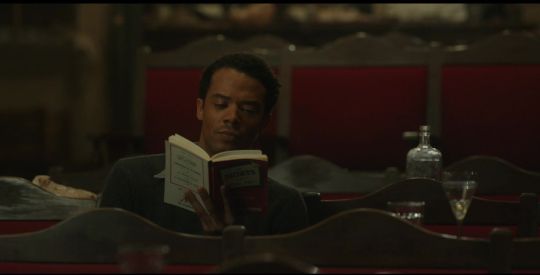
Fall 1947: Louis discusses R-26, where he's been visiting in 2x4.
ALOIS: So, you've been showing your work at the Perriers' salon? LOUIS: Always something interesting happening there. ALOIS: Maybe before the war more than now. But then I'm rarely out of my gallery.

Late 1947 - Early 1948
(There's A LOT that happens from 2x4 - 2x6 that I'm really unsure of. The ONLY diehard dates I have are for Louis' Wols painting, and Sam's Godot play. So I have to assume everything below happens within that timeframe.)
Celeste, Estelle & Santiago investigate Lestat at Roget's.
Armand lies about the Maitre coup: "In retrospect, the buffoon was in the audience, oblivious to the conspiracy uniting around him."
Madeleine almost gang-raped; Claudia reveals her vampirism
Claudia's final diary entry "Diaries are friends of last resort. I have found one not made of paper and glue. F**k these vampires."
Louis buys the Wols / Let's Go Sunning plays on the radio(?)
Louis meets Madeleine; Armand meets Madeleine
Sam's Godot play
Late 1947 - Early 1948: Santiago's Maitre coup starts; steals Claudia's diaries. Louis dumps DreamStat; Loumand's Arun/Maitre roleplay starts. (Because of the rain & lack of snow, I wonder if this is Fall 1987 / Spring 1948?)

Late 1947 - Early 1948: Sam starts writing several scripts:
Whatever play Santiago was rehearsing for, in 2x6's title "Like the light by which God made the world, before He made light." Meanwhile, the coven is passing around Claudia's diaries.
Waiting for Godot
The Trial script(?)
Late 1947 - Early 1948: Celeste, Estelle & Santiago investigate Lestat at Roget's.


Late 1947 - Early 1948: Louis buys a Wols (Alfred Otto Wolfgang Schulze), It's All Over The City (1947).

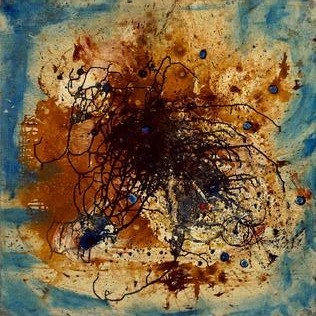



(Question: Is Jack Shaindlin's Let's Go Sunning (which plays as Santiago eavesdrops on Loumand banging) anachronistic, or does AMC know something I don't--more than likely--cuz Google keeps telling me it was first used in 1954 in the film Garden of Eden?)
Late 1947 - Early 1948: Louis meets Madeleine; Armand meets Madeleine (the same night, since they're all in the same clothes).


1948
HUGE timeskip. The ONLY definite timeframe I have is Godot.
October 9 1948 - January 29 1949: Waiting for Godot, by The Vampire Samuel Barclay / IRL Samuel Barclay Beckett.

Right after this scene, they cut to Dubai!Louis describing IRL events from 1949. So I'm cutting this post off here, to put all of that in context wrt the Trial, that also happened in 1949.
#interview with the vampire#louis de pointe du lac#loumand#the vampire armand#iwtv tvc metas#justice for claudia#read a dang history book#europe#i hate math#louis de pointe du black
31 notes
·
View notes
Text
10 Jewish Women from History Part 4
Roza Papo (1914-1984, Yugoslavia)
A physician and general of the Yugoslav People's Army, and the first woman to rise to rank of general on the Balkan Peninsula. Born to a Sephardi Jewish family in Sarajevo, she studied at the School of Medicine in Zagreb and worked as a physician. In 1941, after the invasion of Yugoslavia, she made contact with several resistance groups. She had the rank of officer, captain, and major. After the war, she continued her career as a physician in the army, and became the first head of the Military Medical Academy, formulating the first criteria for the selection of military physicians. She published over 50 papers, is credited with introducing new diagnostic methods, and has received six medals for her contributions. In 1973, she was promoted to the rank of major general, the first woman general in all the Balkans.
Fira Benenson (1898-1977, America)
A Russian born fashion designer and dressmaker who grew up in Baku, Saint Petersburg, London, Paris, and New York City. After her family fortune took a hit in the Great Depression and Wall Street Crash of 1929, she opened a dress shop in NYC and began to gain a reputation in the fashion industry. She worked with Bonwit Teller, until she created her own company focused on simple but elegant clothing that women could wear throughout their daily routines. She worked with Princess Grace of Monaco and Pat Nixon, and designed many clothes for women over forty.
Lilli Henoch (1899-1942, Germany)
Born in Konigsberg, East Prussia, she and her family moved to Berlin. She was a track and field athlete who set four world records and won 10 German national championships in four different disciplines. She participated and set world records in the discus, the shot put, and the four by one hundred meters relay. After 1933, she and other Jews were forced to leave the BSC by race laws, so she joined the Jewish Gymnastics and Sports Club 1905, where she played team handball. She also worked as a gymnastics teacher. She was entered into the International Jewish Sports Hall of Fame in 1990, and was honored with a Stolperstein in Berlin in 2008.
Lily Krongerber (1890-1975, Hungary)
A Hungarian figure skater born in Budapest, she was Hungary's first World Champion. She won two bronze medals and four gold medals in the World Championships, and participated in the first official one in 1906. She was inducted into the International Jewish Sports Hall of Fame in 1983, and the World Figure Skating Hall of Fame in 1997.
Adlene Harrison (1923-2022, America)
An American politician and the first Jewish woman to serve as Mayor of a major U.S. city, as well as Dallas's first Jewish mayor and first female mayor.
Ida Silverman (1882-1973)
A Jewish philanthropist who helped co-found approximately 100 synagogues. She is the only woman to have served as VP of the Zionist Organization of America and the American Jewish Congress. Born in Kovno, Russia, her family emigrated to the US when she was an infant. She was honored as Jewish Mother of the Year in 1951, and Rhode Island mother of the year in 1954. She has both a forest and a village in Israel named after her. She and her husband were jointly inducted into the Rhode Island Heritage Hall of Fame in 1971.
Rachel, Countess d'Avigdor (1816-1896, England)
A philanthropist and communal worker, she was privately educated by some of the most eminent teachers of the time. She was involved in communal institutions, including Jewish owned businesses, and was also a signatory of the firsts mass petition in Britain for women to vote.
Sara (200 CE ~ 600 CE, Roman Empire)
A Roman convert to Judaism buried within the Jewish catacombs of Rome. Also known as Veturia Paulla. She was honored as the mother of several synagogues.
Yalta (Period of Babylonian Talmud)
One of the few women named in the Babylonian Talmud, and wife of Rav Nachman, who was a sage from around 250 CE. The second most mentioned women in the Talmud, she is described as breaking 400 jugs of wine after a guest offended her and womenkind. She also offers her husband counsel, and was able to come up with non-kosher food that tasted the same as kosher food.
Helena of Adiabene (?-50/56 CE, Parthian Empire)
Queen mother of Adiabene, a vassal state of the Parthian Empire. She converted to Judaism around the year 30 CE, and was known for her generosity. Her strictness of keeping to the mitzvot was mentioned in the Talmud.
16 notes
·
View notes
Text
JOAN CRAWFORD. (1297)
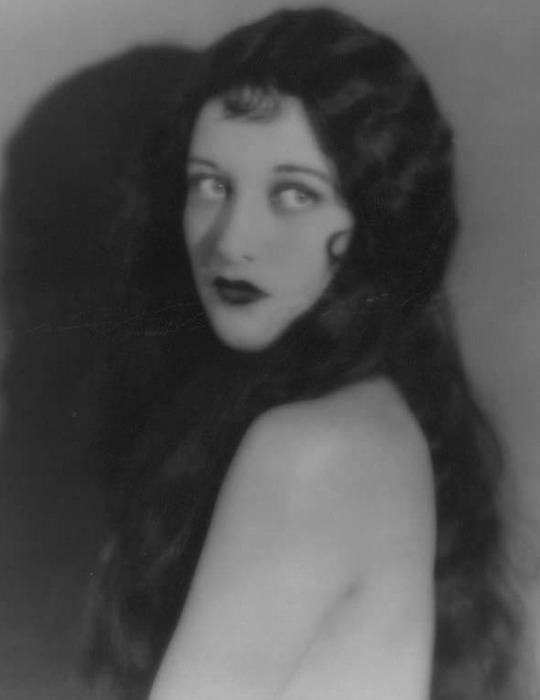
A forgotten legend who shined as a star in the early 1930's. Joan Crawford was born Lucille Fay LeSueur on March 23, 190? and died of cancer on May 10, 1977). She was an American actress. She started her career as a dancer in traveling theatrical companies before debuting on Broadway and later on to Hollywood.

Crawford often played hardworking young women who find romance and financial success. These "rags-to-riches" stories were well received by Depression-era audiences and were popular with women. Crawford became one of Hollywood's most prominent movie stars and one of the highest paid women in the United States, but her films began losing money. By the end of the 1930s, she was labeled "box office poison".
In 1945 she won the the Academy Award for Best Actress in the film Mildred Pierce.

The original 1947 French Grande Movie Poster.
Mildred Pierce is a 1945 American melodrama/film noir directed by Michael Curtiz. The film was based on the 1941 novel by James M. Cain. In 1996, Mildred Pierce was deemed "culturally, historically, or aesthetically significant" and selected for preservation in the United States Library of Congress National Film Registry.
Mildred Pierce (film) - Wikipedia

Mildred Pierce (1945) - IMDb 7'9
A hard-working mother inches towards disaster as she divorces her husband and starts a successful restaurant business to support her spoiled daughter.
link https://ok.ru/video/2167780608639
Crawford married four times. Her first three marriages ended in divorce; the last ended with the death of husband Al Steele. She adopted five children, one of whom was reclaimed by his birth mother. Crawford's relationships with her two older children, Christina and Christopher, were acrimonious. Crawford disinherited the two and, after Crawford's death, Christina published the tell-all memoir Mommie Dearest.
AUDIO BOOK
youtube
link https://youtu.be/g6lNyQZyjjI
Mildred Pierce is a psychological drama by James M. Cain published by Alfred A. Knopf in 1941.
A story of “social inequity and opportunity in America" set during the Great Depression, Mildred Pierce follows the trajectory of a lower-middle class divorcee with two children in her tragic struggle to achieve financial and personal success.

Mommie Dearest is a 1981 American biographicalpsychological drama film directed by Frank Perry. The film is an adaptation of Christina Crawford's 1978 autobiography book of the same name. The film follows her and her brother Christopher's upbringing under their adoptive mother, actress Joan Crawford, depicting her as abusive, controlling, and manipulative, prioritizing her Hollywood career over her family.

Mommie Dearest (film) - Wikipedia
Mommie Dearest (1981) - IMDb 6'6
link https://ok.ru/video/2754941749787
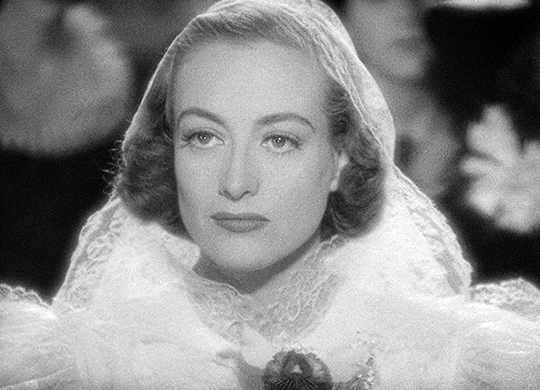
reblogged from deforest go to Jun 30 JOAN CRAWFORD in THE SHINING HOUR — 1938, dir. Frank Borzage. See film at: https://ok.ru/video/260626516643 wikipedia The Shining Hour imdb The Shining Hour (1938) 6'4
#1297#actress#joan crawford#film#Mildred Pierce#1945#dir. Michael Curtiz#novel#audibook#1941#James M. Cain#video#Mommie Dearest#1981#dir. Frank Perry#THE SHINING HOUR#1938#dir. Frank Borzage#2025-02-16
14 notes
·
View notes
Text
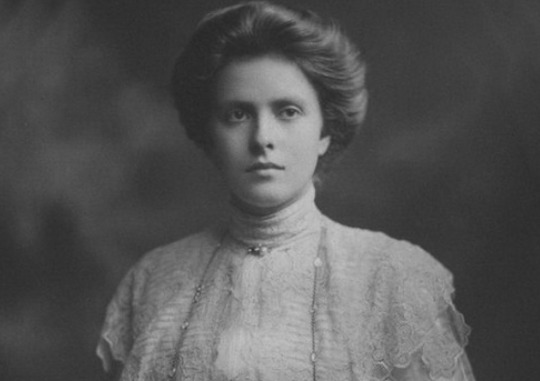
THURSDAY HERO: Princess Alice
Amazing story! Princess Alice was an unconventional royal who prioritized helping others over wealth and privilege. She devoted her life to good deeds and spiritual growth, and was notable among European royalty for taking Jews into her home during the Holocaust.
Princess Alice stood out for another reason: she was deaf from birth.
Born in 1885 at Windsor Castle, Alice was the great-granddaughter of Queen Victoria. She learned to lip read at a young age, and could speak several languages. Alice was widely regarded as the most beautiful princess in Europe.
At age 17, Alice fell in love with dashing Prince Andrew of Greece and they were married in 1903. Alice and Andrew had four daughters and a son. Their son Philip would later be married to Queen Elizabeth II. Alice communicated with her children mainly in sign language.
Political turmoil in Greece forced the royal family into exile. They settled in a sleepy suburb of Paris, where Alice threw herself into charitable work helping Greek refugees. Her husband left her for a life of gambling and debauchery in Monte Carlo.
Relying on the charity of wealthy relatives, Alice found strength in her Greek Orthodox faith. She became increasingly religious, and believed that she was receiving divine messages and had healing powers. She yearned to share her faith and mystical experiences with others, but instead was dismissed as mentally unhinged.
Alice had a nervous breakdown in 1930. She was committed against her will to a mental institution in Switzerland, with a dubious diagnosis of schizophrenia. Alice did not even get a chance to say goodbye to her children. Her youngest, 9 year old Philip, returned from a picnic to find his mother gone.
Alice tried desperately to leave the asylum, but was kept prisoner in Switzerland for 2 1/2 years. During that time, her beloved son Philip was sent to live with relatives, and her four daughters married German princes. Alice was not allowed to attend any of their weddings.
Finally, in 1932, Alice was released. She became a wanderer, traveling through Europe by herself, staying with relatives or at bed & breakfast inns. In 1935, Alice returned to Greece, where she lived alone in a modest two bedroom apartment and worked with the poor.
The Germans occupied Athens in April 1941. Alice devoted herself to relieving the tremendous suffering in her country. She worked for the Red Cross, organizing soup kitchens and creating shelters for orphaned children. Alice also started a nursing service to provide health care to the poorest Athenians.
In 1943, the Germans started deporting the Jews of Athens to concentration camps. Alice hid a Jewish widow, Rachel Cohen, and her children in her own apartment for over a year. Rachel’s late husband, Haimaki Cohen, was an advisor to King George I of Greece, and Alice considered it her solemn duty to save the remaining Cohen family.
Alice lived yards from Gestapo headquarters. When the Germans became suspicious of her and started asking questions, she used her deafness as an excuse not to answer them. Alice kept the Cohen family safe until Greece was liberated in 1944.
After the war, Alice founded her own religious order, the Christian Sisterhood of Martha and Mary, and became a nun. She built a convent and orphanage in a poverty-stricken part of Athens. Alice dressed in a nun’s habit consisting of a drab gray robe, white wimple, cord and rosary beads – but still enjoyed smoking and playing cards.
In 1967, after a Greek military coup, Alice finally returned to Great Britain. She lived at Buckingham Palace with her son Philip and daughter-in-law, Queen Elizabeth II.
Alice died in 1969. She owned no possessions, having given everything to the poor. Before she died, Alice expressed a desire to be buried at the Convent of Saint Mary Magdalene on the Mount of Olives in Jerusalem, but instead was laid to rest in the Royal Crypt in Windsor Castle.
In 1988, almost 20 years after she died, Alice’s dying wish was finally granted. Her remains were sent to Jerusalem, where she was buried on the Mount of Olives.
In 1994, Alice was honored by the Holocaust Memorial in Jerusalem (Yad Vashem) as Righteous Among The Nations. Her son Prince Philip said of his mother’s wartime heroism, “I suspect that it never occurred to her that her action was in any way special. She was a person with a deep religious faith, and she would have considered it to be a perfectly natural human reaction to fellow beings in distress.”
Video
208 notes
·
View notes
Text
We pay tribute to pianist Michael Ponti
Jeremy Nicholas Tuesday, October 18, 2022
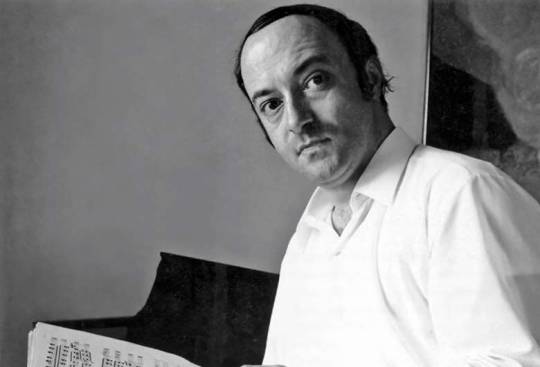
Michael Ponti’s death a week before his 85th birthday comes more than two decades after the stroke that effectively ended his career, like those of Godowsky, Solomon and Cyril Smith.
‘Looks like a truck driver, plays like a god’ is what they used to say. With his thick neck and compact build, there remained a determination and an inner fire that his long illness failed to quench. Opinionated, punchy, and with an ego the size of his once-vaunted technique, Ponti refused to give in. It was only an indomitable spirit and the constitution of an ox that kept him going for so long.
The myriad recordings he made for the Vox Turnabout label in the 1960s and '70s of forgotten romantic piano concertos were a revelation to a whole generation of collectors, works that had often not been dusted off for a century and more but which sparkled into new life in the hands of this amazing musician, making you wonder why they were never played in today's concert halls.
What Hyperion’s Romantic Piano Concerto series has been doing since 1991 with multiple pianists, Ponti did on his own. Look at the list of composers whose forgotten concertos he championed, most often in premiere recordings: d’Albert, Moszkowski, Chopin-Wilkomirski, Reinecke, Bronsart, Henselt, Thalberg, Rheinburger, Scharwenka, Hiller, Glazunov, Rubinstein, Berwald, Medtner, Moscheles, Bronsart, Raff, Balakirev, Goetz, Liapunov, Litolff, Stavenhagen, Sinding, Alkan – to say nothing of the complete piano music of Tchaikovsky, Scriabin and Rachmaninov, making Ponti in each case the first pianist to commit these intégrales to disc.
Famous for marathon recitals, his 1972 New York debut at Tully Hall produced nine encores. ‘I ended with Scriabin’s 5th Sonata,’ he told me. ‘It was midnight by the time we had all had enough.’ Disappointed that he was never invited to play with the Berlin Phil or the New York Phil (‘We can’t all have a career like Kissin’), his legacy is a body of recordings which, despite their sometimes-indifferent sound quality, will live on in the affections of pianophiles for many years to come.
Born in Germany (Freiburg im Breisgau), with an English first name and an Italian surname, he was fiercely American as his hopeless addiction to baseball might have indicated. His father was first generation Italian born in Seattle, Washington, and was an officer with the United States consulate in Stuttgart at the time Michael was born on 29 October 1937. His mother was German but later became an American citizen. At one year old she took him to the West Coast of America, his father joining them in 1941. Two years later the family was in Washington D.C. where Michael had his first lessons. Aged ten, he began seven years of studies with Gilmour McDonald, a pupil of Leopold Godowsky. Aged eleven, he presented all 48 Preludes and Fugues of the Well-Tempered Clavier from memory in four recitals at the YMCA in Washington.
In 1955 with his father posted to Frankfurt, Ponti began six years of studies with Erich Flinsch (1905-90), an assistant in Vienna to Emil von Sauer, himself a celebrated pupil of Liszt. Flinsch set about turning Ponti into a concert pianist, telling him ‘if you can’t play the Brahms-Paganini, Liszt Don Juan Fantasy, Schumann Toccata, Chopin études and late Beethoven sonatas by the time you’re twenty it’s time you found another profession’. Ponti rose to the challenge. ‘I practiced day and night until I could play them. The result was, among other things, a big technique.’
He had made his first recordings in 1961 (a 45 rpm disc of Ravel’s Jeux d’eau and Alborado del gracioso for the Christophorus label followed by an LP of Schubert’s Wander Fantasy and Beethoven’s Eroica Variations), but his international career was launched only after winning first prize in the 1964 Busoni Competition, making his debut in Vienna with five performances of Bartok’s Piano Concerto No.2 conducted by Wolfgang Sawallisch. Then in 1968 came the call from Vox. His first album for the label, in September 1968, was of Moscheles’s Piano Concerto No.3 (with ten etudes from Opp.70 and 95 as fillers) followed the same month by Henselt’s finger-busting Concerto (with the difficult Op.2 études for side 2). More than fifty recordings followed.
Riding on the back of his new-found celebrity with Vox, Ponti made that New York debut in Tully Hall in January 1972. ‘I started off with Beethoven Op.2 No.1, then the Tchaikovsky G major sonata, the three hardest Rachmaninov preludes including the big E minor, both books of Brahms-Paganini, the Scriabin G sharp minor sonata, Petrushka and then nine encores. I asked the audience to choose any one from a list of 54. I ended with Scriabin’s 5th Sonata. It was midnight by the time we had all had enough.’
Ponti’s repertoire was far wider than the concerto recordings for which he is best known, embracing Scarlatti and all the Beethoven sonatas (‘I’ve played the complete 32 sonatas four times in Frankfurt’) through to Ravel and Iain Hamilton who wrote his Sonata for Ponti (1976). Seven discs of live unedited performances issued on the defunct Dante label contain music by Haydn, Mussorgsky, Brahms, Schumann, Beethoven, Chopin, Liszt, Scriabin and Rachmaninov. Recordings on the Lys label with the Ponti-Zimansky-Polasek Trio have works by Dvořák, Brahms, Mozart, Beethoven, Shostakovich, Tchaikovsky and Mendelssohn. For the Accord label in 1997 the trio set down the two piano trios by Saint-Saëns. For Deutsche Grammophon he accompanied Dietrich Fischer-Dieskau in an LP of songs by Charles Ives. He recorded Liszt and Brahms solo works for Naxos and Kuhlau’s Concerto (with his own bravura cadenza) for Unicorn-Kanchana. His own first choice is a private recording of him in Brahms 2 (‘my all-time favourite concerto – and always will be’) and the Khachaturian concerto with the Sydney Orchestra. They are indeed stunning performances. There are another roughly fifty CDs of live recitals waiting for some adventurous label to issue.
I was lucky enough to meet and interview Michael Ponti several times, the first in 1979, later in his home in Eschenlohe near Garmisch (Bavaria) with his beautiful wife Beike, the last exactly three years ago in Innsbruck when his son Max gathered together some of his father's friends to make a filmed tribute to him.
RIP Michael and thanks - you fought a good fight these last years and you have left the world a better place.
------
He was one of the titans of the 20th Century you never heard of...I've got his big Tchaikovsky box, and one of the Scriabin boxes (of the Sonatas), as well as the disc of the Raff and Reinecke Concertos.
I remember hearing him in an interview with one of the DJs at the classical station in Austin, KMFA, when he was in Austin for a concert. He had an incredible musical memory, with over 700 pieces under his finger.
And yet he never played with any of the truly major US orchestras. One has to wonder why, when faced with his formidable talent, evidenced in his vast recorded output.
I hope some label does issue those 50 CDs of his live recordings...I'd love to hear his Brahms 2nd. Horowitz is king of that concerto in my book, the 1942 recording with Toscanini...I'd wager Ponti takes a similar, more muscular approach.
6 notes
·
View notes
Text
Carstober prompt #2 and 3: Ghost Driver and Spare Parts

Halloween Eve, 1941
“…and the only thing left after the monster attack was a crumpled license plate covered in fresh crankcrase oil!” A red Cadillac Series 62–one James Glenrunner–leapt towards the small crowd of vehicles that were parked around him in a loose half-circle, laughing maniacally.
It was Halloween and the Glenrunner family was enjoying dinner and homespun Halloween-themed stories in the garage…as it was the only place large enough to accommodate everyone all at once.
Normally, they’d be handing out metallic treats to the younger townsfolk, but it was a cold, rainy night with intermittent thunder and sleet. No one with any lick of common sense was cruising the roads.
Annette Longhauler, a sleek black and chrome Cadillac Series 62 Sedannette, was parked alongside her husband, Samuel, a red, International Harvester Company semi. Sam had the distinction of the being both the largest truck in the Longhauler family and one of the strongest trucks east of the Mississippi. Normally, he’d be on the road through December, but a downturn in the economy had forced him to renegotiate his Time and Material Contract with the Federal Government, and he was garaged until further notice…. which was fine in his book, as it meant that he could spend some quality time with his family.
He smiled down at a small, navy-blue car who was nestled between him and his wife: Their soon-to-be-three year old son, Hudson.
“Ack! Small bites, there, Hud… ” Annette snagged the end of her son’s teething toy—an old truck bumper--and tried to pull it away from him, but the child bit down as hard as he could and stubbornly refused to let go. Annette pushed herself upright for more leverage, bringing all four of Hud’s tires off of the ground. The kid growled and shook his body from side to side, like a gator with a fresh kill.
“Eh, let him have it,” Chuckled a blue Oldsmobile model 50E. “He can’t swallow the whole thing anyhow…”
Annette’s blue eyes flicked across her hood to focus on her father. “But Pa…he could bite off something that’s too big for his crop.”
Otis Glenrunner, patriarch of the Glenrunner family, smiled and waved his front left tire, dismissively. “His teeth ain’t strong enough for that yet…”
“If ya say so…” She set her son down, and returned to a resting position. Hud followed closely, and once she was situated, he nestled back up against her front fender and continued gnawing on the bumper, looking very much proud of himself.
“Are y’all even listening…?” James pouted.
“We heard ‘ya,” Otis answered, looking annoyed.
“And…what did you think?”
“Urm…” Otis stammered.
“It was…definitely a story,” Annette added, trying to sound upbeat.
“But…I thought it was supposed to be a scary story…” Hud chimed in, distracted.
Otis laughed loudly before he could stop himself; even Sam chuckled.
“Hud, that wasn’t very nice,” Annette corrected, gently.
“But…I wasn’t scared.” The infant insisted, setting down the bumper and giving his mother a pleading look. “And you always tell me to be honest…”
Otis continued laughing; he couldn’t help himself.
James pursed his lips. “My story was plenty scary…just ask your uncle.” He gestured towards the ramp leading down into the basement. James’ twin brother, Carl, was staring back at him with wide, terrified eyes; his teal body was shaking loudly.
“Uncle Carl is a-scared of everythin’…” Hud snorted.
Now it was Annette’s turn to laugh. “You aren’t wrong…”
“Hey!”
Annette smirked at her brother and stuck her tongue out at him.
There was a long pause, as everyone in the group looked around at everyone else. “So…who’s gonna be the narrator this time?” Otis wondered.
“Whoever tells it better make sure it's scary!” Hud, glared at James and tamped his little tire for emphasis. Suitably chastised, James pulled up along side his father, and took a long swig from the communal moonshine jug.
There was another pause, then Sam said in low voice. “Urm…I have a story.”
All eyes turned to him.
“Really, Pa? You have a scary story?” Hud pushed himself upright and turned so that he could smile up at his father. Sam was a truck of few words, and for him to offer…well, it definitely got everyone's attention. “Is it really, really scary?”
The semi nodded. “Very much so.” He cast a sly look over his hood at James. “Because unlike James’ story…mine actually happened.”
Everyone just stared at him. Annette, especially, looked surprised.
“Yay! A scary story!” Hud zipped up to him and did a cute little spin, his expression rapturous.
Sam raised a tire. “Settle down, now,” He rumbled with a smile, and Hud quickly scooted near his front bumper, barely able to contain his excitement.
“My most common run is Atlanta to Jacksonville. It’s an easy drive, even with a full load of lumber, and if you do it at night, there’s less traffic to contend with…except for the Ghost Drivers.”
Hud’s eyes were wide. “Oo!”
“’Ghost Drivers’?” Annette wondered, leaning closer.
Sam nodded. “I noticed the first one on my junior run on the 78, well east of Athens. It was a lady car, with sky-blue paint, just…driving slowly on the shoulder without a care in the world. Now that stretch was miles and miles away from anything in either direction, and I was likely the first vehicle that she’d seen since dusk. Be that as it may, she didn’t acknowledge me as I drove past. Instead, she just kept straddling the white line with a sort of vacant smile. I figured that she might be camping somewhere in the area, and didn’t think anything of it…but she was only the first.”
It’s not every trip you spot them. But sometimes you see a few on a single go, but I don’t ever recall seein’ them during the day; it’s only ever at night, and only when you’re driving far from civilization in the dark. The other trucks call them ‘Ghost Drivers’ or ‘Moon Wanderers,’ but I prefer the term “Fog Liners,” since that’s always where you always find them: on the fog line, following it the way a train follows its track. All makes and models just…driving with nothing but the line and the pale light of the moon to guide them. After a time, you don’t really pay them no mind…”
Annette stared at her husband with a look of surprise bordering on shock. Despite doing their best to work through their communication issues, Sam had never mentioned any of this before.
“One night, a few months ago, I passed by an old Buick model 10. She was so rusted that there weren’t a splash of paint left on her, and the metal on her undercarriage would crumble and flake off anytime she hit a dip in the road.” His gaze became distant then, like he was getting lost in the memory. “And…I remember her eyes looking strange. They were dull and…colorless, like they belonged to someone who was just about to pass on into the next life, but she was smiling the most serene smile you’d ever seen. And then I noticed that her tires were all low on air. Not flat, but very low. So low that she probably wouldn’t make it to the next town…which was some fifty miles distant. And they made a very distinctive sound: a slow, rhythmic ‘fwump, fwump, fwump…’”
He paused, seemingly for effect, but then he frowned and looked away. “I…wanted to keep on driving, the scene unsettled me so much…but if she really was in trouble, I just couldn’t leave her out there for the scavengers. So… I pulled onto the shoulder some distance ahead of her…and…I could hear the ‘fwump, fwump, fwump…’ of her tires as she drew near…”
Hud scooted closer to Annette; eyes wide.
Even James and Otis shuddered and drew nearer to one another. Carl was no where to be seen. No sooner than Sam said “ghost,” he’d disappeared into the basement, well out of hearing range.
“‘Ma’am, are you ok?’ I called out, once I could see her in my rear views. She looked so much more...disheveled up close, and I remember feeling very scared…but I was also worried for her, and that gave me the courage to call out to her a second time. ‘Ma’am? Your tires are low and you’re in the middle of nowhere...’
“She Just kept smiling and driving forward.
“My fuel pump was goin’ a mile a minute. ‘She must be having some sort of medical episode, and needed help,’ I thought to myself. I dropped my trailer and turned around, but then my brakes locked up. And, no matter how much I tried to move, I couldn’t; I was frozen in place. And all I could do was watch as she got closer…and closer…”
Hud reversed until he was right up against Annette’s front left tire.
“Seeing as I was blocking the shoulder, she was forced to stop…and that’s when she looked at me. Looked right through me with those colorless eyes. She opened her mouth in a silent gape…and she grinned, her teeth pale and broken. Then she darted forward, faster than a diving night hawk, and grabbed my tire…but not with her mouth. It was some sort of mechanical arm that she had stowed in a panel on her right, front fender. Before I knew what was happening, she was dragging me down the road, unfettted by my weight. And the more I struggled, the more she just…smiled. After what seemed like an eternity, my brakes unlocked and I spun with all the fight I had in me. It was like hitting a concrete bridge pylon.” He paused and drew in a ragged breath. “She disappeared into the ditch…and I just stared at the spot where she’d gone over, unable to move, unbreathing for what seemed an eternity…” His voice trailed off.
“What happened to her?” Hud asked, fearfully.
“She climbed out of the ditch on her own power, and other than the rust that she’d had on her from the start, she was fine. No dents. No broken windows. Nothing. With how hard I hit her…I should have folded her in half…but there she was moving around like nothing was amiss. And she met my gaze, then: She was still smiling, but she seemed…disappointed, and she maneuvered around me, though her eyes still bored onto mine. ‘Fwump, fwump, fwump…’ the sound of her tires faded as she disappeared into the night. I idled there, stunned, for a long time. Eventually, I worked up the nerve to pick up my trailer, and continue on. I caught up to her, in short order, and she was following the shoulder same as before. But as I passed her, her eyes followed me. And the last thing I saw of her as I drove away was her wide, happy, broken smile.”
The silence that claimed the room was profound.
“I stopped at the next town, even though I had planned on driving through the night. My whole front right fender was caved in from where I’d struck her. And while I was getting fixed up, I started talking to the folks there. Apparently, I was the first person to even attempt to speak to a Ghost Driver,” he shivered, suddenly, even though the garage wasn’t cold. “Since then, I’ve seen plenty more, driving slowly on the shoulder, followin’ the fog line in the dark... I even saw a kid once.” He looked out at the group of vehicles. “But you know what’s strange…?”
“You mean aside from creepy, withered cars dragging a SEMI down the road?” James chuckled, looking nervous.
Sam just smiled. “The real strange thing is that every last one of ‘em notices me, now. They watch me through their rear views as I come up behind them, lock eyes with me when I’m near, and then keep watching me until I’m well out of range of their headlights.”
Hud squealed, and for a moment Annette was concerned that the story had been TOO scary. But, she shouldn’t have worried. Hud was fearless, and instead of cowering or crying, he began to circle the garage, excitedly, babbling about wanting to meet the rickety, old Ghost Driver who could toss his father around like a toy.
The truck grinned, and intercepted the child on one of his laps. “Was that scary enough for you, Hud?”
“It was even better than the ghost story Bobby’s Pa told us last year!” His little tires tapped with glee. “This is amazing! I can’t wait to tell Bobby; he’s gonna be so jealous.” He made a playful donut that brought him around to his father’s fender, the same fender that had been damaged in the story. The metal had been repaired and repainted, but it didn’t stop Hud from reaching up to prod it gently with his tire.
“Yeah…” James said, haughtily, puffing himself up. “That didn’t really happen.”
Sam locked eyes with the Cadillac. He didn’t argue or get angry; he just stared. And as the minutes stretched, longer, and longer, James’ eyes widened, and he slunk back looking horrified. “By the Manufacturer….you’re serious?”
Sam’s expression changed, tottering somewhere between bemused, hesitant and tense. As if he were glad for the company, but discomfited by having to recall the events of that night. His gaze shifted as he noticed Otis watching him with a look he couldn't place.
After a moment, everyone, even Hud, noticed the silent conversation, held with their eyes. Otis was an older car, and well-travelled. Not to the same extent as his son-in-law, but you don't run moonshine through the Georgia high country and not see your fair share of…oddities.
“You’re lucky to have gotten away with just a dented fender,” Otis said at last.
Sam simply shrugged, and took a long drink from the moonshine jug. “That's what they say…”
Annette goggled. Hud tamped his tires excitedly. James looked like he was going to be sick. And Carl, despite doing his darndest to stay out of pane-shot, heard the confirmation and fainted loudly.
Character refs/ref photos
Annette
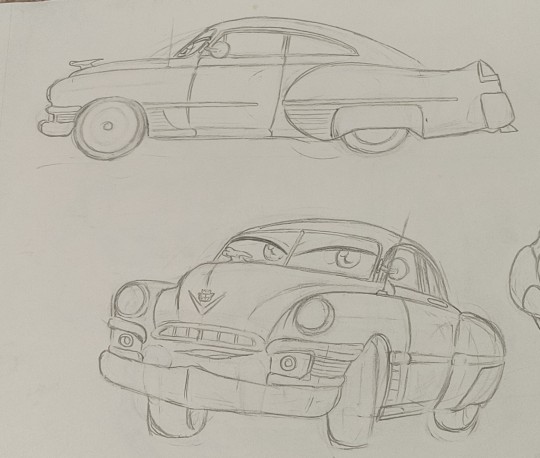
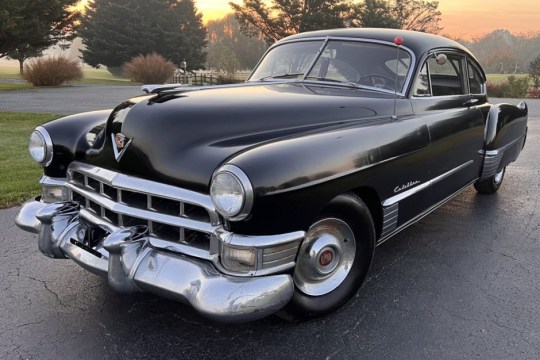
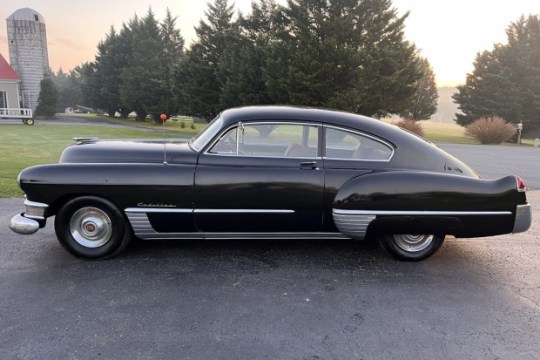
Otis
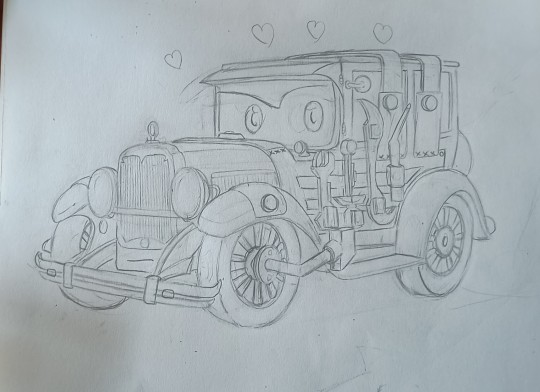


Sam
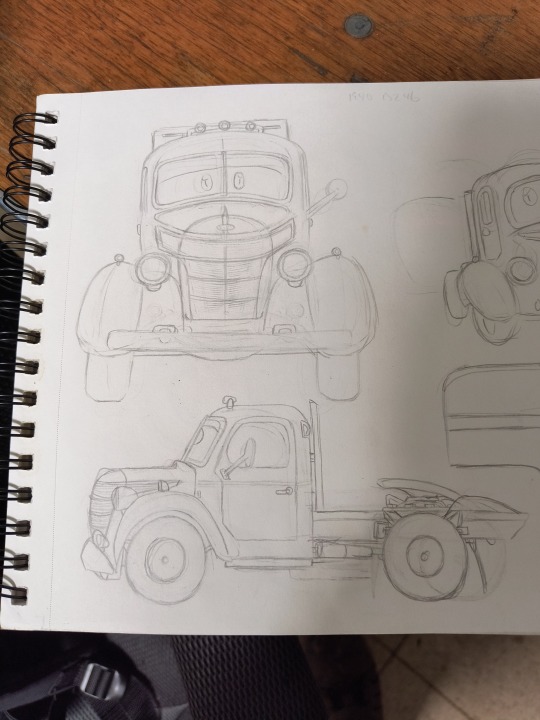
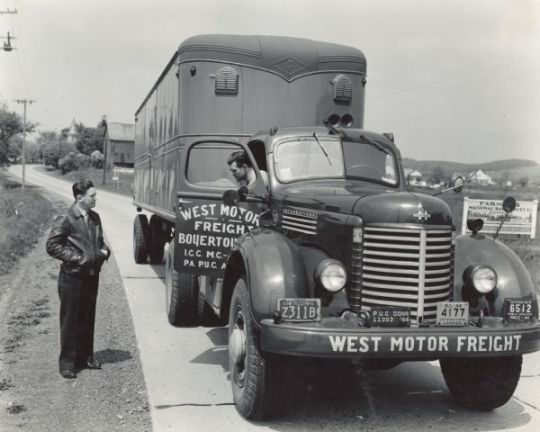
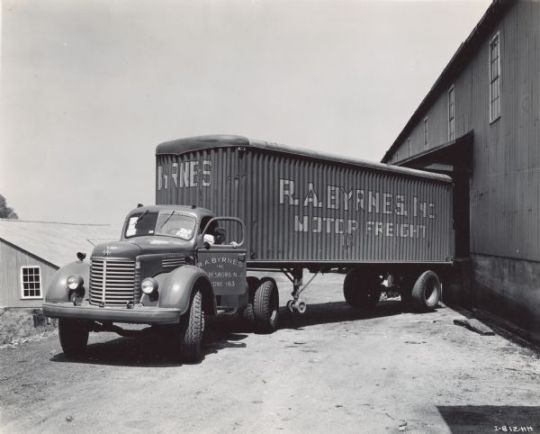
James and Carl
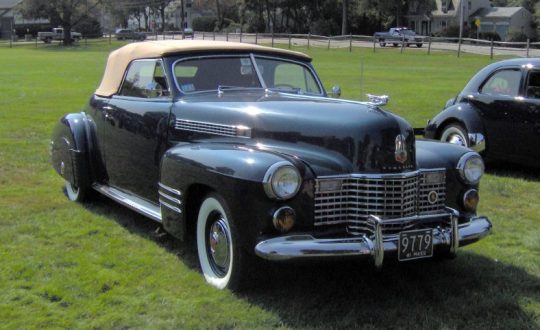
Baby Doc

#cars fandom#pixar cars#cars#cars pixar#disney cars#disney pixar cars#doc hudson#cars headcanons#cars fanfiction#carstober2024#Carstober2024#fabulous hudson hornet#halloween#spooky month
10 notes
·
View notes
Text
Claude Rains Character Masterlist!
Here's a handy-dandy guide of all the wonderful characters Claude Rains has portrayed over a nearly seven decade long career. We encourage all to have a gander at all these invisible men, prefects of police, fathers, criminal masterminds, otherworldly beings, and men of history alike! Each link will take you to a picture of that specific character, so even if you're not familiar with them, you can send in propaganda anyhow (such as 'what a lovely wig!', 'astonishing facial hair!', or even 'such a beautiful hat!'). We also realize that two of these characters share a name - John Stevenson (from The Last Outpost and Strange Holiday, respectively), so when submitting propaganda for these characters, please indicate which one! We will try our best to sort through the submissions regardless!
List is in chronological order, however, we are omitting for reasons explained in the pinned post the characters of Clarkis from Build Thy House and The Mayor from The Pied Piper of Hamelin!
(1933) The Invisible Man - Dr. Jack Griffin/The Invisible Man
(1934) Crime Without Passion - Lee Gentry
(1934) The Man Who Reclaimed His Head - Paul Verin
(1935) The Mystery of Edwin Drood - John Jasper
(1935) The Clairvoyant/The Evil Mind - Maximus
(1935) The Last Outpost - John Stevenson
(1936) Hearts Divided - Napoleon Bonaparte
(1936) Anthony Adverse - Marquis Don Luis
(1937) Stolen Holiday - Stefan Orloff
(1937) The Prince and the Pauper - Earl of Hertford/Edward Seymour
(1937) They Won't Forget - D.A. Andrew 'Andy' J. Griffin
(1938) White Banners - Paul Ward
(1938) Gold Is Where You Find It - Colonel Christopher 'Chris' Ferris
(1938) The Adventures of Robin Hood - Prince John
(1938) Four Daughters - Adam Lemp
(1939) They Made Me a Criminal - Detective Monty Phelan
(1939) Juarez - Emperor Louis Napoleon III
(1939) Sons of Liberty - Haym Salomon
(1939) Daughters Courageous - Jim Masters
(1939) Mr. Smith Goes to Washington - Senator Joseph Harrison Paine
(1939) Four Wives - Adam Lemp
(1940) Saturday's Children - Henry Halevy
(1940) The Sea Hawk - Don José Álvarez de Córdoba
(1940) Lady with Red Hair - David Belasco
(1941) Four Mothers - Adam Lemp
(1941) Here Comes Mr. Jordan - Mr. Jordan
(1941) The Wolf Man - Sir John Talbot
(1942) Kings Row - Dr. Alexander Tower
(1942) Moontide - Nutsy
(1942) Now, Voyager - Dr. Jaquith
(1942) Casablanca - Captain Louis Renault
(1943) Forever and a Day - Ambrose Pomfret
(1943) Phantom of the Opera - Erique Claudin/The Phantom
(1944) Passage to Marseille - Captain Freycinet
(1944) Mr. Skeffington - Job Skeffington
(1945) Strange Holiday - John Stevenson
(1945) This Love of Ours - Joseph Targel
(1945) Caesar and Cleopatra - Julius Caesar
(1946) Notorious - Alexander Sebastian
(1946) Angel on My Shoulder - Nick
(1946) Deception - Alexander Hollenius
(1947) The Unsuspected - Victor Grandison
(1949) The Passionate Friends - Howard Justin
(1949) Rope of Sand - Arthur 'Fred' Martingale
(1949) Song of Surrender - Elisha Hunt
(1950) The White Tower - Paul DeLambre
(1950) Where Danger Lives - Frederick Lannington
(1951) Sealed Cargo - Captain Skalder
(1952) The Man Who Watched the Trains Go By/The Paris Express - Kees Poppinga
(1956) Lisbon - Aristides Mavros
(1959) This Earth is Mine - Phillipe Rambeau
(1960) The Lost World - Professor George Edward Challenger
(1961) Battle of the Worlds - Professor Benson
(1962) Lawrence of Arabia - Mr. Dryden
(1963) Twilight of Honor - Art Harper
(1965) The Greatest Story Ever Told - Herod the Great
16 notes
·
View notes
Text
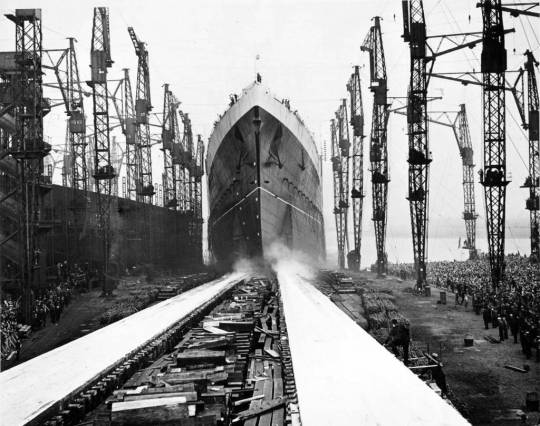
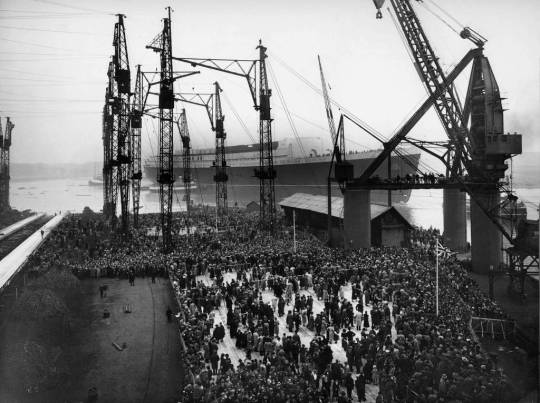

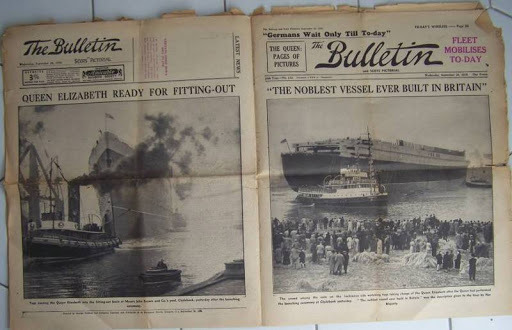
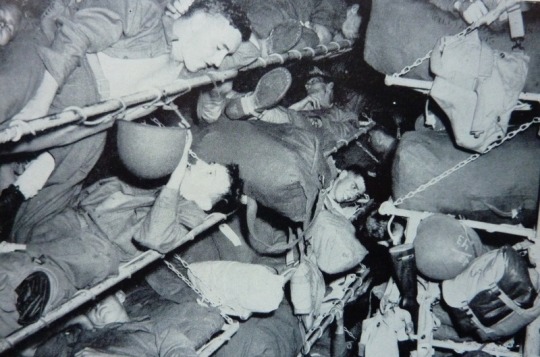
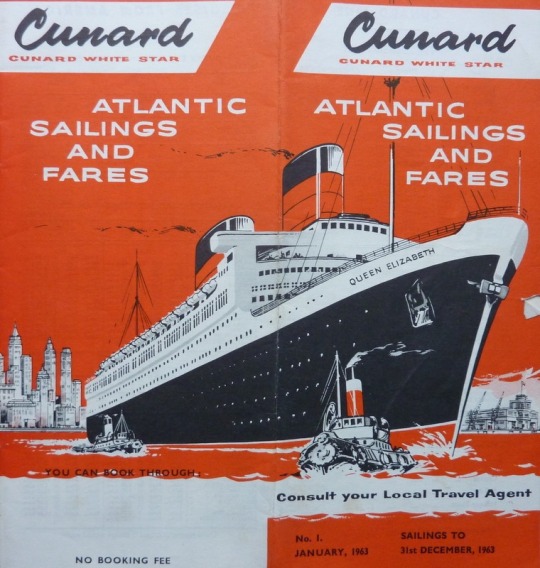
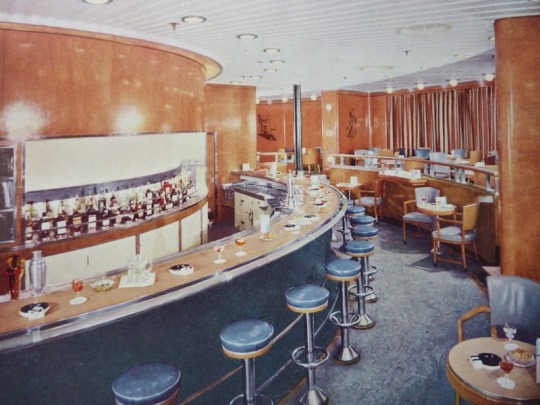
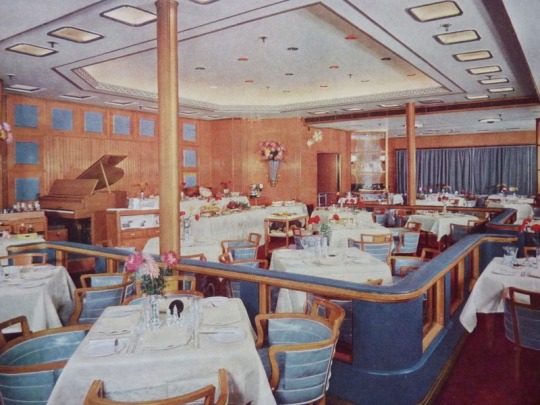


On September. 27th 1938, Queen Elizabeth, the world's largest ocean liner was launched on the Clyde.
The Queen Elizabeth was the sister ship of the Queen Mary, which was christened four years earlier, I covered this yesterday.
Unfortunately, her role as a luxury liner was short-lived - with the outbreak of the Second World War the following year, the Queen Elizabeth entered service in February 1940 as a troopship and didn’t return to her original role until October 1946.
The Cunard line’s enormous luxury ocean-goer was built on the river Clyde to sail between Southampton and New York, named after the Queen Consort (later the Queen Mother).
Following the outbreak of World War II, the security of Queen Elizabeth became a major concern for Cunard-White Star and the British Government. It was not safe to keep the ship in Scotland, as it was well known that she was a tempting target for the Luftwaffe.
Queen Elizabeth was painted in military grey before departing Clydebank for what was rumoured to be a short journey to Southampton. However, once in open sea the ship’s course was altered – Queen Elizabeth’s maiden voyage was to New York!
Thus, the untested and untried ship – then the world’s largest ocean liner – made a secret dash across the Atlantic to the safety of America. She arrived unannounced in New York, surprising officials and New Yorkers alike. Queen Elizabeth berthed alongside Queen Mary, Normandie and Mauretania Queen Elizabeth was requisitioned for wartime service on 13 November 1940.
The ship sailed to Singapore where she was refurbished into the world’s largest troop carrier. During the works, defensive armaments and a degaussing coil (to protect against mines) were fitted.
On 11th February, Queen Elizabeth sailed from Singapore bound for Sydney, Australia, arriving ten days later. Here the conversion into troop ship was completed and Queen Elizabeth undertook her first trooping voyage to the Middle East, carrying troops to Suez.
Queen Elizabeth later sailed to Canada, and carried troops to Sydney, while in 1942 the Admiralty considered possible future uses for the Queens. Their trooping capacity meant they were the most valuable large troop transports in service. When the USA entered the war in December 1941, the future use of Queen Elizabeth along with Queen Mary changed. Ultimately, the ships were most valuable operating the trooping service on the North Atlantic, and following a major overhaul Queen Elizabeth commenced this service. She remained in Government requisition for the rest of the war.
At the end of the war, Queen Elizabeth was famous on both sides of the Atlantic. The ship, which had carried over 750,000 troops, now commenced work repatriating those troops as well as the war brides.
Queen Elizabeth was released from Admiralty service in 1946. Her post-war overhaul and refurbishment was carried out both on the Clyde and at Southampton. This overhaul saw luxury passenger interiors installed aboard Queen Elizabeth, in preparation for civilan transatlantic services. Additionally, ship was painted in Cunard livery, while the machinery was overhauled.
Queen Elizabeth was given her full sea trials, and then officially accepted by Cunard. The ship made her maiden peacetime passenger voyage to New York on 16 October 1946.
Queen Elizabeth proved a popular ship and over the coming months the ship was well booked. On 17 April 1947, Queen Elizabeth ran aground near Brambles Bank as she made her approach to Southampton in thick fog. The ship was later successfully refloated.
In September 1951 Queen Elizabeth made her 100th peacetime transatlantic crossing. But as more passengers took to airline services, Cunard realised that they needed to upgrade Queen Elizabeth in order to keep her relevant in a changing world with a particular focus on longer duration cruising
As such, during a refurbishment in January 1952 the ship’s fuel capacity was increased allowing her to sail longer distances without refuelling. Additionally air-conditioning was fitted throughout, to allow the ship to undertake voyages into warm climates. Four years later, Queen Elizabeth was fitted with stabilisers, which greatly improved passenger comfort.
When Pan American World Airways flew the first Boeing 707 service across the Atlantic, the future for Queen Elizabeth was in doubt. By 1962 the decline in the number of passengers on the Atlantic shipping service (they had moved their business to airliners) led to an announcement that the ship would be used more and more for cruises.
Cunard gave Queen Elizabeth another major overhaul in Greenock, which involved an interior refurbishment and the creation of an outdoor swimming pool on Queen Elizabeth’s aft deck. This was combined with a new lido area which, it was hoped, would allow the ship to attract more cruise passengers.
Sadly, the 1966 Seaman’s Strike meant that the refreshed ship was laid up in Southampton for a number of weeks, which further impacted on Cunard’s financial viability. On 8 May 1967, Cunard announced the fates of the two Queens. Queen Mary was withdrawn from service later that year, while the Queen Elizabeth was to be retained until Autumn 1968, by which time it was hoped the QE2 would be ready as her replacement.
Queen Elizabeth was initially sold to a group of Philadelphian businessmen, who intended to turn her into a floating hotel in Florida. The ship made her final transatlantic crossing on 5 November 1968 before she was withdrawn from Cunard service.
Once in Florida, the ship was opened to the public, however this venture didn’t last and the ship was closed in late 1969. In 1970 the ship was auctioned and bought by C.Y.Tung, Hong Kong, who planned to convert the liner into the world’s largest Floating University.
Re-named Seawise University, the ship sailed for Hong Kong to be converted. The transformation was almost complete when a series of fires broke out aboard the ship, causing her to burn out and sink in the harbour, a sad end to a beautiful ship.
You can find more pics and info on the link below, including an 8 minute video. Among the pics you will see that although Queen Elizabeth was a luxury liner, it was not this way when it was in service during WW2, troops were crammed into every available space.
17 notes
·
View notes